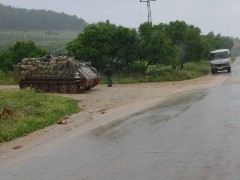 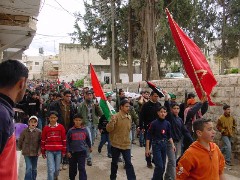 The
sounds of Zababdeh: The
sounds of Zababdeh:
4:30 AM, Rooster (3 sec.) 4:45 AM, Muslim prayer (40 sec.) 6:00 AM, Church bells (40 sec.) 6:30 AM, sheep 7:30 AM, National Anthem (40 sec.) 18 hrs./day, Generator (5 sec.) Night-time, shooting (5 sec.) |
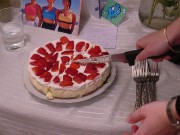 Monday,
4/1/02: It's April Fool's Day, but we don't feel much like joking.
The reports that are coming out of Ramallah and Bethlehem are increasingly
disturbing. There was no school once again under a Ministry of Education
order - this has happened only a few days during the entire seventeen months
of the
Intifada and siege, indicating how serious the situation
is and how angered the people here by how their president is being treated.
We spent the day doing some overdue cleaning of the apartment, trying to
get our minds off of the situation here. We still turned on the TV
periodically, needing to keep abreast of what is happening. CNN brought
a story about a group of international peace activists who have made their
way into the Presidential compound. We know some of them and have
been impressed by their commitment to non-violent resistance to the Occupation.
It was one glimmer of hope for this day that these folks, as bullets and
tank shells and suicide bombs are flying, are able to make enough of an
impact to garner press coverage. We gathered with the other ex-pats
at the University to celebrate a birthday and to share in our concern and
worry together. Unfortunately, they celebrated with cheesecake, and
we're still fasting for Lent... Monday,
4/1/02: It's April Fool's Day, but we don't feel much like joking.
The reports that are coming out of Ramallah and Bethlehem are increasingly
disturbing. There was no school once again under a Ministry of Education
order - this has happened only a few days during the entire seventeen months
of the
Intifada and siege, indicating how serious the situation
is and how angered the people here by how their president is being treated.
We spent the day doing some overdue cleaning of the apartment, trying to
get our minds off of the situation here. We still turned on the TV
periodically, needing to keep abreast of what is happening. CNN brought
a story about a group of international peace activists who have made their
way into the Presidential compound. We know some of them and have
been impressed by their commitment to non-violent resistance to the Occupation.
It was one glimmer of hope for this day that these folks, as bullets and
tank shells and suicide bombs are flying, are able to make enough of an
impact to garner press coverage. We gathered with the other ex-pats
at the University to celebrate a birthday and to share in our concern and
worry together. Unfortunately, they celebrated with cheesecake, and
we're still fasting for Lent... |
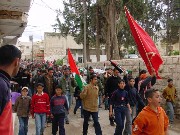 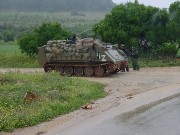 Tuesday,
4/2/02: School began this morning. The students and teachers
came from Zababdeh. None came from nearby Qabatiya, and a few (and
only one teacher) came from Tubas. Only three students came from
Jenin - perhaps to Tuesday,
4/2/02: School began this morning. The students and teachers
came from Zababdeh. None came from nearby Qabatiya, and a few (and
only one teacher) came from Tubas. Only three students came from
Jenin - perhaps to 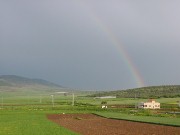 stay
in Zababdeh rather than in that city. Before the first period was
over, the parents in Tubas were calling for their children to come home
- a new military checkpoint appeared at the edge of Tubas - right in the
middle of what used to be Area "A". We sent the bus back to Tubas,
the two foreign volunteers (read: us) accompanying the kids both to calm
them and with the idea that a foreign passport still has more sway with
soldiers than a Palestinian ID. The soldiers, after making us wait
for a few minutes, merely waved us through. Other cars trying to
enter Tubas waited, and those trying to leave were forced to turn around.
We entered the village, taking the children directly to their homes. We
saw about a dozen armed men wandering around. This place feels on
the verge of unbelievable chaos. We returned back to Zababdeh, waiting
at the impromptu checkpoint for about half an hour. We could see
some figures running through the forested hills away from Tubas through
the rain. The soldiers seemed to see it too, and one of the three
tanks went on the move - not a comforting sight. stay
in Zababdeh rather than in that city. Before the first period was
over, the parents in Tubas were calling for their children to come home
- a new military checkpoint appeared at the edge of Tubas - right in the
middle of what used to be Area "A". We sent the bus back to Tubas,
the two foreign volunteers (read: us) accompanying the kids both to calm
them and with the idea that a foreign passport still has more sway with
soldiers than a Palestinian ID. The soldiers, after making us wait
for a few minutes, merely waved us through. Other cars trying to
enter Tubas waited, and those trying to leave were forced to turn around.
We entered the village, taking the children directly to their homes. We
saw about a dozen armed men wandering around. This place feels on
the verge of unbelievable chaos. We returned back to Zababdeh, waiting
at the impromptu checkpoint for about half an hour. We could see
some figures running through the forested hills away from Tubas through
the rain. The soldiers seemed to see it too, and one of the three
tanks went on the move - not a comforting sight. 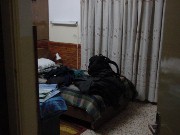 Eventually,
all of the tanks headed back to the nearby military base, leaving the road
open for the first time in a couple of days. When we reached Aqaba, the
village between Tubas and Zababdeh, we saw some kids with their shoes coated
in mud - probably the same ones we had seen up in the hills. Some
were no older than twelve. We returned to school to continue teaching.
We learned that a 20-year-old man from Zababdeh had just been killed as
he opened fire at a checkpoint near Jenin. Zababdeh's first "martyr".
The entire village turned out for the funeral (video
- 7 sec.) at the mosque, as the church bells sounded the death knell (audio
- 7 sec.). No one knows what will happen tonight, if anything.
We smiled weakly at the rainbow appearing over the fields near our home.
A faint sign of hope. Tanks are moving through the middle of Tubas,
Sharon is calling for Arafat's expulsion, and there is fighting in nearby
Qabatiya. The picture of Palestinians forced to dig a mass grave
in a hospital parking lot is only one of many hideous images burned into
our memories. We decided, at Abuna Aktham's invitation, to sleep
in the Convent. We've packed bags for a few days and are trying to
decide what to do next. Eventually,
all of the tanks headed back to the nearby military base, leaving the road
open for the first time in a couple of days. When we reached Aqaba, the
village between Tubas and Zababdeh, we saw some kids with their shoes coated
in mud - probably the same ones we had seen up in the hills. Some
were no older than twelve. We returned to school to continue teaching.
We learned that a 20-year-old man from Zababdeh had just been killed as
he opened fire at a checkpoint near Jenin. Zababdeh's first "martyr".
The entire village turned out for the funeral (video
- 7 sec.) at the mosque, as the church bells sounded the death knell (audio
- 7 sec.). No one knows what will happen tonight, if anything.
We smiled weakly at the rainbow appearing over the fields near our home.
A faint sign of hope. Tanks are moving through the middle of Tubas,
Sharon is calling for Arafat's expulsion, and there is fighting in nearby
Qabatiya. The picture of Palestinians forced to dig a mass grave
in a hospital parking lot is only one of many hideous images burned into
our memories. We decided, at Abuna Aktham's invitation, to sleep
in the Convent. We've packed bags for a few days and are trying to
decide what to do next. |
|
Wednesday, 4/3/02: With no school, no telephones, Jenin surrounded, and a "martyr" from Zababdeh, we decided to head out. The only thing left to do in Zababdeh is suffer whatever it is that the people are going to face. We can do more good on the other side of the Green Line. We called a taxi, promised Abuna that we'd stay in touch, and headed off on our now well-traveled mud road towards the border. The rain made what was already mud even harder to traverse, but our driver got us into the town of Jalame. As we rode along, we could see an Apache helicopter directly overhead. These have been used for targeted assassinations of Palestinian militants. Even though logic told us not to worry, our bodies told us otherwise. Our driver was too afraid to take us to the main road, given the coming and going of Israeli military, so we walked from the edge of the town of Jalame. So many tanks had been traveling to and from Jenin that the road was an inch or more deep in mud. We looked back to see two Apache helicopters hovering over Jenin. We could also see smoke rising from the town and heard awful military-sounding noises. We looked back again to see a line of tanks rumbling their way up the deserted road towards the checkpoint - thus we shared a destination. Our legs began to grow weak - the Israeli military's behavior has always been questionable at best, but the last few months have rendered it moreso - even when it comes to internationals. We made it to the checkpoint, where a soldier who recognized us greeted us warmly and said he would see us when we came back. We headed up in another taxi to Jaffa of Nazareth to stay with American friends. Considering what's happening a few short miles away, the situation on the other side of the Green Line felt absurd - people jogging, shopping, riding bikes, living their lives unhampered. There is fear here, certainly, instilled by suicide bomb attacks. But the atmosphere here and there cannot ve compared. We spent most of the day on the phone with friends all over the West Bank hearing their stories and reassuring them with the hope - growing more distant by the moment - that our retreat to Nazareth is temporary. We've left a lot behind in Zababdeh. Leaving this morning, we took one last look around our apartment and had to come to the realization that we may never see any of it again. May we be proven wrong. The word from Zababdeh (by cellphone) is better than most: electricity use will be limited to a few hours at night (due to limited supplies of petrol for the generator), no telephones to the outside except the overly-crowded cellphone networks. Friends in Bethlehem and Ramallah tell different stories, though - food shortages, no electricity, running low on water, constant shooting, no medical services, afraid to leave to get supplies to stay...The people in Jenin tell theirs - 150 tanks around the city, 12 inside, no electricity, constant shooting, an old man killed by the Catholic church at the center of town, a nurse killed, the Refugee Camp invaded again, tanks outside the door, lots and lots of fear...We also talked to two American friends living in the West Bank, married to Palestinians. They both - as well as their children - are American citizens. The consular officials who are arranging evacuations of American citizens from Bethlehem told our friend that her children (an infant and a toddler) cannot be evacuated, because they have also Palestinian IDs. Our friend near Ramallah has also been told that she cannot leave with her two sons. What is the meaning of citizenship, then? Absurd. Stunning. Frightening. We've also received hundreds of emails about the situation from eyewitnesses - technology triumphs for truth. All day we've been hearing F-16s heading south - towards Jenin and who knows where. We remain restless and very worried about our friends. Lord have mercy. |
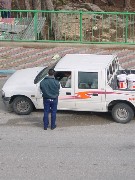 Thursday,
4/4/02: Woke up to a police radio - on the main road outside
where we're staying, a police checkpoint had been set-up to pull-over vehicles
selectively and question the drivers. These are fairly typical in
Israel anyway, and with the fear of suicide bombings, they're omnipresent.
Can't help but wonder what kind of instructions these police may have received
for profiling young Arab men. We're exhausted, but it's hard to rest.
We're trying to find a balance between taking care of ourselves and hoping
to have some positive impact on the crisis. This is exacerbated by
the fact that we have no contact at all with Zababdeh - yesterday it was
the land telephone lines, but today it's the mobile phones, too.
We know that Zababdeh is small potatoes compared to nearby Jenin, but that
offers little comfort - we have many students and friends there, too.
We have been able to get through to friends in that city - constant shelling,
tanks, air power, that we could hear in the background. There's no
electricity and no one dares go outside, but to date the water hasn't been
cut. Even so, they're very worried. The Ramallah stories of
house-to-house searches and arrests are all so disturbing, even when people
are found "innocent" - whatever that means these days. On a practical
level, though, with no electricity in Jenin their perishables will go bad.
Then what? Word from Ramallah is that, when the curfew is lifted
for a few hours, people go to buy bread at bakeries that have no flour
and essentials at stores that have been ransacked by Israeli soldiers.
One friend in Jenin, when we told him we were praying for their safety,
said, "Pray for the Israelis, too. As Christians, we don't want anyone
to be killed. And pray for Sharon. We hope he will open his
eyes to see the truth." Listening to someone under siege with words
like that brought tears to our eyes. We talked to our Dutch friend
in Nablus - as a nurse, she decided
to stay for the invasion, and her organization agreed that she should.
She's staying at the Anglican hospital, since there is a total curfew
in effect. They have no electricity and are operating on generators
there. The Anglican compound at the Old City has a tank parked right
in front of it - we haven't heard from Fr. Hossam, but are sure he's staying
low. Zababdeh remains foremost in our minds, though. We heard
from various friends today who had to leave their international assignments
in Beirut, Tehran, and Chile. As one friend consoled us about the
difficulty of leaving, she said, "It's agonizing. We left Beirut
three times and came back twice." We also heard indirectly from an
Israeli friend who is back in the reserves. He had filed as one of
the "refusenik" soldiers, but everything
happened so fast that he suddenly found himself in Ramallah doing house-to-house
searches. His previous tour of duty on the West Bank and the horrors
he was forced to witness convinced him that the Occupation was wrong and
that it was up to soldiers to end it. And now he's back in it, feeling
that he can't abandon his fellow soldiers in "war" and wouldn't know how
to leave, anyway. Can't help but feel some kindredness with him,
given our recent flight. Can't help but feel angry with him either,
wondering how many soldiers like him are simply going along and "just following
orders," though in their heart of hearts they know that they are wrong.
Can't help but worry about his safety, either - he's a thoughtful, caring,
philosophical young man. We did take a break to have lunch with friends
who are working in Ibillin with Fr. Chacour's
Mar Elias College, as well as our gracious hosts here in Nazareth.
We dined at an Arab-owned restaurant with largely Arab clientele - the
place was practically empty, though. The restaurant business is down
drastically because of the fear of suicide bombings. Of course, it
was 2:30 in the afternoon by the time we got there. We've been discussing
lending our time and talents to folks up here while we're "out", since
it looks like it'll be a while longer than we hoped before we can return.
We're expecting to help out, but our first priority is Zababdeh and the
situation in the West Bank. We finally got word from there - a text
message via cellphone: "NOW THEY START IN QABATYA SO WE HAVE BAD SITUATION."
Allah
ma'kum - God be with you. Thursday,
4/4/02: Woke up to a police radio - on the main road outside
where we're staying, a police checkpoint had been set-up to pull-over vehicles
selectively and question the drivers. These are fairly typical in
Israel anyway, and with the fear of suicide bombings, they're omnipresent.
Can't help but wonder what kind of instructions these police may have received
for profiling young Arab men. We're exhausted, but it's hard to rest.
We're trying to find a balance between taking care of ourselves and hoping
to have some positive impact on the crisis. This is exacerbated by
the fact that we have no contact at all with Zababdeh - yesterday it was
the land telephone lines, but today it's the mobile phones, too.
We know that Zababdeh is small potatoes compared to nearby Jenin, but that
offers little comfort - we have many students and friends there, too.
We have been able to get through to friends in that city - constant shelling,
tanks, air power, that we could hear in the background. There's no
electricity and no one dares go outside, but to date the water hasn't been
cut. Even so, they're very worried. The Ramallah stories of
house-to-house searches and arrests are all so disturbing, even when people
are found "innocent" - whatever that means these days. On a practical
level, though, with no electricity in Jenin their perishables will go bad.
Then what? Word from Ramallah is that, when the curfew is lifted
for a few hours, people go to buy bread at bakeries that have no flour
and essentials at stores that have been ransacked by Israeli soldiers.
One friend in Jenin, when we told him we were praying for their safety,
said, "Pray for the Israelis, too. As Christians, we don't want anyone
to be killed. And pray for Sharon. We hope he will open his
eyes to see the truth." Listening to someone under siege with words
like that brought tears to our eyes. We talked to our Dutch friend
in Nablus - as a nurse, she decided
to stay for the invasion, and her organization agreed that she should.
She's staying at the Anglican hospital, since there is a total curfew
in effect. They have no electricity and are operating on generators
there. The Anglican compound at the Old City has a tank parked right
in front of it - we haven't heard from Fr. Hossam, but are sure he's staying
low. Zababdeh remains foremost in our minds, though. We heard
from various friends today who had to leave their international assignments
in Beirut, Tehran, and Chile. As one friend consoled us about the
difficulty of leaving, she said, "It's agonizing. We left Beirut
three times and came back twice." We also heard indirectly from an
Israeli friend who is back in the reserves. He had filed as one of
the "refusenik" soldiers, but everything
happened so fast that he suddenly found himself in Ramallah doing house-to-house
searches. His previous tour of duty on the West Bank and the horrors
he was forced to witness convinced him that the Occupation was wrong and
that it was up to soldiers to end it. And now he's back in it, feeling
that he can't abandon his fellow soldiers in "war" and wouldn't know how
to leave, anyway. Can't help but feel some kindredness with him,
given our recent flight. Can't help but feel angry with him either,
wondering how many soldiers like him are simply going along and "just following
orders," though in their heart of hearts they know that they are wrong.
Can't help but worry about his safety, either - he's a thoughtful, caring,
philosophical young man. We did take a break to have lunch with friends
who are working in Ibillin with Fr. Chacour's
Mar Elias College, as well as our gracious hosts here in Nazareth.
We dined at an Arab-owned restaurant with largely Arab clientele - the
place was practically empty, though. The restaurant business is down
drastically because of the fear of suicide bombings. Of course, it
was 2:30 in the afternoon by the time we got there. We've been discussing
lending our time and talents to folks up here while we're "out", since
it looks like it'll be a while longer than we hoped before we can return.
We're expecting to help out, but our first priority is Zababdeh and the
situation in the West Bank. We finally got word from there - a text
message via cellphone: "NOW THEY START IN QABATYA SO WE HAVE BAD SITUATION."
Allah
ma'kum - God be with you. |
|
Friday, 4/5/02: Today after prayers there were demonstrations by Arab-Israelis in solidarity with the Palestinians in the West Bank. Folks were a bit nervous about what response they might meet from the police, as they remembered a year and a half ago, when thirteen protesters and on-lookers were killed by police in what is here called Black October. The Orr Commission was established to "look into" police conduct and find the perpetrators of these deaths - to no great surprise, but to great anger, the commission has still failed to resolve the murders. Today, fortunately, demonstrations were peaceful and the police stayed away. We came across a smaller demonstration in Jaffa-Nazareth by the Islamic Party, also peaceful and without police. Despite the Israeli rhetoric crying, "we are at war", the situation here is, to us, unbelievably normal. There is no comparison. No doubt that suicide bombers have done their damage not only in terms of non-combatant casualties, but also in terms of fear. But at the very least, Israelis have electricity, water, telephone service, food, etc. People may stay away from cafes and malls, but most still can go to their jobs, schools, places of worship. Friends in Nablus are getting by with next to nothing. The Israeli forces tried to enter the Old City, but couldn't because the ancient streets are too narrow for tanks. Instead, they delivered an onslaught of rockets. "It's hell. It's really hell," said our friend, a Dutch nurse who decided to stay rather than escape. The television continues to show the Israeli attacks on journalists. Nablus does not have many journalists in the city, and Jenin has even fewer - if any. A friend from the Arab-American University of Jenin tried to return across the Green Line back to Zababdeh. The soldiers wouldn't let her cross. She tried going through the fields, but the tanks and Apaches were on the move. She retreated to Nazareth, hoping to try again tomorrow. Apparently the Israeli army passed through Zababdeh yesterday on their way to Tubas, though we haven't heard any news directly - now contact with Tubas is lost, too. A friend in Jenin spoke with distress about the situation there. No electricity, constant shooting nearby. He is worried about the dozens of people in Jenin who are on dialysis but cannot get to the hospitals - even if they could, they have no electricity. He still wishes safety for all, Israeli soldiers included. He related a story from the first Intifada when he was a student at Birzeit University. He came across a wounded Israeli soldier, whom he drove to Hadassah Hospital - such is his understanding of Christian faith. The irony is that, while he is living in the midst of news, batteries on his radio will not last much longer, and he will have no idea what is happening around him. Hope flickers as Zinni meets with Arafat and as Powell plans his trip here. But it all feels like too little too late - so much blood has been shed, so many people have died, and are dying now. We spent a good part of the day on the telephone with our elected officials in DC. It feels so necessary, but like just a drop in the bucket. |
|
Saturday, 4/6/02: We've continued our work of writing and staying on top of what's happening on the West Bank as much as we can. For news from Zababdeh, we spoke with a couple of folks at the University. Our friend returned today - she didn't have to ride a tractor after all, but passed right through the checkpoint. There are twenty-three students who have stayed on campus, and everyone is - thankfully - bored and safe. They've had cookouts and get-togethers to keep sane. We were able to talk to them because the University sits on a mountain top where they can get Israeli cellphone (rather than Palestinian) service. The incursion into Tubas yesterday, as we learned, was into one building - there were six gunmen. The Israeli soldiers went in, killed the six, and left. The army is still in Qabatiya and Jenin - we talked with our friends there. They are out of water and perishables. There is no electricity and their radio batteries have almost died. That means that, though there's a maelstrom going on outside their door, they have no idea what the news is - how ironic. They are all exhausted, especially the children, since there is constant shooting around them - night and day. Their home is very close to the refugee camp. In Nablus, the story is much the same - no electricity, and the attacks on the Old City are ferocious with constant tank fire. We also spoke with a friend in Bethlehem as we could hear tank noises through the telephone. 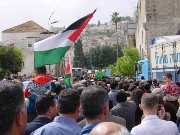 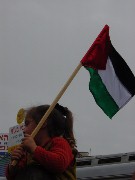 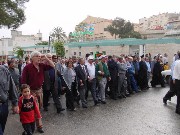 In
addition to everything else, their kids are extremely restless and want
to go outside - they don't understand why they can't. The curfew
was lifted for a few hours yesterday, and they briefly went outside - but
not for long, because there was gunfire and four or five casualties were
later reported. Meanwhile, those holed up in the Church of the Nativity
haven't eaten since Thursday. For all the coverage that Bethlehem
and Ramallah have been getting, everyone fears that the situation is even
worse in the north - however, with no media coverage, no one knows.
We headed out for a demonstration of Arab Israelis in Nazareth to show
their outrage at the atrocities being committed in the West Bank.
It was also prompted by the mistreatment of Arab MKs (members of the Knesset)
who were physically and verbally assaulted as they tried to deliver relief
aid to Ramallah yesterday. There were thousands in the peaceful demonstration
that began at Mary's Well, continued
past the Church of the Annunciation,
and onto the Nazareth Municipality. It felt good - we've been spending
the last five days constantly on-line and on the telephone, so the exercise
alone was refreshing. But it also felt like we were doing something tangible.
There In
addition to everything else, their kids are extremely restless and want
to go outside - they don't understand why they can't. The curfew
was lifted for a few hours yesterday, and they briefly went outside - but
not for long, because there was gunfire and four or five casualties were
later reported. Meanwhile, those holed up in the Church of the Nativity
haven't eaten since Thursday. For all the coverage that Bethlehem
and Ramallah have been getting, everyone fears that the situation is even
worse in the north - however, with no media coverage, no one knows.
We headed out for a demonstration of Arab Israelis in Nazareth to show
their outrage at the atrocities being committed in the West Bank.
It was also prompted by the mistreatment of Arab MKs (members of the Knesset)
who were physically and verbally assaulted as they tried to deliver relief
aid to Ramallah yesterday. There were thousands in the peaceful demonstration
that began at Mary's Well, continued
past the Church of the Annunciation,
and onto the Nazareth Municipality. It felt good - we've been spending
the last five days constantly on-line and on the telephone, so the exercise
alone was refreshing. But it also felt like we were doing something tangible.
There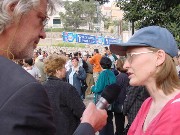 were men, women, and children, Christian, and Muslim, together. We
spent most of the time marching near a group of women, who were enthusiastically
chanting throughout the march (video -
3 sec.). It was also quite incredible to walk together, Christian
and Muslim, past the Church and the parking lot used by the shehab id-diin
as a mosque. This piece of real estate has been a place of division
and hostility in the community between Muslims and Christians. But
here they were, coming together in a peaceful march. We arrived at
the
were men, women, and children, Christian, and Muslim, together. We
spent most of the time marching near a group of women, who were enthusiastically
chanting throughout the march (video -
3 sec.). It was also quite incredible to walk together, Christian
and Muslim, past the Church and the parking lot used by the shehab id-diin
as a mosque. This piece of real estate has been a place of division
and hostility in the community between Muslims and Christians. But
here they were, coming together in a peaceful march. We arrived at
the 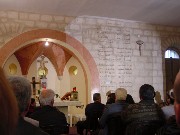 Municipality,
where the political speeches began. At that point, we were approached
by VPro Dutch Radio for an interview on
why we were there. Not exactly what we had in mind for getting the
word out, but it'll do...We then headed to the Latin Church in Migdal Ha-Emeq.
A Jewish area, the town was built on the ruins of a Palestinian village
called Mujeddel which was depopulated and destroyed in 1948. The
former residents mostly live in nearby Nazareth and travel to the church
- all that remains of the Arab town. Abuna Jack, an Arab Franciscan
priest, has given a wonderful spirit to the community of faith, which is
made up of former residents and other area Catholics. Abuna led the
congregation with praise songs on his guitar (audio
- 9 sec.) while the lyrics were projected onto the stone wall. Municipality,
where the political speeches began. At that point, we were approached
by VPro Dutch Radio for an interview on
why we were there. Not exactly what we had in mind for getting the
word out, but it'll do...We then headed to the Latin Church in Migdal Ha-Emeq.
A Jewish area, the town was built on the ruins of a Palestinian village
called Mujeddel which was depopulated and destroyed in 1948. The
former residents mostly live in nearby Nazareth and travel to the church
- all that remains of the Arab town. Abuna Jack, an Arab Franciscan
priest, has given a wonderful spirit to the community of faith, which is
made up of former residents and other area Catholics. Abuna led the
congregation with praise songs on his guitar (audio
- 9 sec.) while the lyrics were projected onto the stone wall. 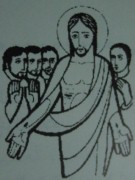 The
Mass followed, insterspersed with guitar-led responses and hymns.
Fr. Jack offered special prayers for the situation at the Church of the
Nativity, saying that the Franciscans - who have been here for 800 years
- hope to see themselves as a bridge between the Israelis and Palestinians.
The lectionary gospel passage was from John 20, one of Christ's post-resurrection
appearances to the disciples. They were meeting in the house where
the doors were locked "for fear of the Jews" (John 20:19). We have
always considered it important for Christians to understand New Testament
references that refer to Jews negatively with caution - not only because
they have been used to justify anti-Semitic violence and hatred, but because
they must be taken in context, that they were meant to offer lessons to
early Christians about how we need to be aware of the hypocrisy and wrongheadedness
within our own communities of faith. After all, Jesus was a Jew -
as were the disciples and the early apostles. Nevertheless, we couldn't
help but think of our friends in Bethlehem, Ramallah, Nablus, and Jenin
who were hiding in the house where their doors are locked "for fear of
the Jews". But there is good news for those who would fear that the
enemy is seeking their destruction - Christ appeared to the disciples.
Christ is with those who fear, even in the face of death. This is
the peace of the Christian message, that God knows our hopes as well as
our fears, for God lived among us as human. May our besieged friends
know this comfort. The
Mass followed, insterspersed with guitar-led responses and hymns.
Fr. Jack offered special prayers for the situation at the Church of the
Nativity, saying that the Franciscans - who have been here for 800 years
- hope to see themselves as a bridge between the Israelis and Palestinians.
The lectionary gospel passage was from John 20, one of Christ's post-resurrection
appearances to the disciples. They were meeting in the house where
the doors were locked "for fear of the Jews" (John 20:19). We have
always considered it important for Christians to understand New Testament
references that refer to Jews negatively with caution - not only because
they have been used to justify anti-Semitic violence and hatred, but because
they must be taken in context, that they were meant to offer lessons to
early Christians about how we need to be aware of the hypocrisy and wrongheadedness
within our own communities of faith. After all, Jesus was a Jew -
as were the disciples and the early apostles. Nevertheless, we couldn't
help but think of our friends in Bethlehem, Ramallah, Nablus, and Jenin
who were hiding in the house where their doors are locked "for fear of
the Jews". But there is good news for those who would fear that the
enemy is seeking their destruction - Christ appeared to the disciples.
Christ is with those who fear, even in the face of death. This is
the peace of the Christian message, that God knows our hopes as well as
our fears, for God lived among us as human. May our besieged friends
know this comfort. |
|
Sunday, 4/7/02: We slept in a bit today. After reviewing the night's catch of email over tea and biscuits (including the news that the Lubbock Avalanche-Journal published a piece on us using one of our updates), we treated ourselves to the first half of a home movie (The Pelican Brief) - nothing like a little conspiracy theory to ease the troubled mind. Then our friends invited us to join them for lunch at a Chinese restaurant in Nahariya, a coastal town near Haifa. We were initially a bit edgy about eating in a restaurant in a Jewish town, but our hosts assured us we were safe. There was a guard at the door, and hardly any customers - so many in Israel are similarly on edge or just plain scared of public gathering places. At any rate, it was a treat to have Chinese food - not something we got much of in Zababdeh - especially the deep fried pineapple dessert. 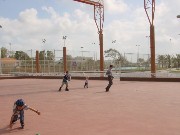 We
then headed to a park on the beach, as our friends' kids roller-bladed
with other children enjoying the sunny day. We took a quick stroll
by the sea and headed back towards Haifa where our friends' son had a basketball
game. We cheered the Nazareth team, which is exclusively Arab kids (except
our American friends' son). It was interesting to see the two teams and
parents interact. We were a bit nervous that things might get ugly, as
happened a few months ago when the opposing team (all Jewish boys) spit
in their hands before shaking hands with the Nazareth team and called them
names. Other teams have refused to shake hands with the Nazareth boys.
However, today everything was done with great sportsmanship, in spite of
the worsening political climate here. Nazareth won by one point in a riveting
28-minute game. We
then headed to a park on the beach, as our friends' kids roller-bladed
with other children enjoying the sunny day. We took a quick stroll
by the sea and headed back towards Haifa where our friends' son had a basketball
game. We cheered the Nazareth team, which is exclusively Arab kids (except
our American friends' son). It was interesting to see the two teams and
parents interact. We were a bit nervous that things might get ugly, as
happened a few months ago when the opposing team (all Jewish boys) spit
in their hands before shaking hands with the Nazareth team and called them
names. Other teams have refused to shake hands with the Nazareth boys.
However, today everything was done with great sportsmanship, in spite of
the worsening political climate here. Nazareth won by one point in a riveting
28-minute game. 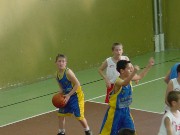 Afterwards,
the host team shared chocolate brownies and soda, making a point to include
everyone from the opposing team. It was very encouraging. Throughout
the day we made calls to friends in the West Bank. A good friend who is
in the Galilee spoke to his family (who managed to contact him with an
Israeli cellphone; they called from their roof, and even then the connection
was bad because of the weak signal), and they related that there is no
electricity in Zababdeh now, and shops are mostly all closed; those that
are open have very little for sale, and the people have no money to buy
goods. The Arab-American University of Jenin,
on the other hand, still has electricity, because they have their own generators
and petrol reserves. Four internationals (Americans and Canadians) have
remained there, spending most of their time reassuring and holding together
the twenty-some female students who are stuck at the dorms. We heard from
a friend in Ramallah who is trying to help the Latin Patriarchate coordinate
a delivery of goods to the Sisters of Charity
and their orphanage in Nablus. Even in the midst of their suffering, they
still manage to think about those who might be going without. Another
friend on the outskirts of Ramallah said there is no water or telephone
service at her home. We spoke to her on her cellphone, on which she can
only receive calls, since the card has run out. They haven't had any perishable
food for a week. She is Belgian, and she was told by her consulate that
they could evacuate her this past Friday. However they could only evacuate
mononationals - that is, she could not bring her two young children because
they had Palestinian IDs in addition to Belgian passports. Of course, she
stayed (as have many internationals in similar situations). The afternoon
before the Israeli invasion, her husband broke his knee. As a result, he
had to wait six days for medical attention. His doctor, a Jerusalem resident
with offices in Jerusalem and Ramallah, was refused entry to Ramallah at
the checkpoint. The soldier said "we donít want you operating on Palestinians
with war wounds." One of our friend's colleagues at the Belgian Technical
Cooperation was taken into detention, like scores of the other men rounded
up from their homes. He was taken to Ofrah, a West Bank settlement, and
never told what the charges against him were. During the first 36 hours,
he and the others were given no food, and made to dig a ditch and roll
blindfolded in the mud in the cold and rain. In the week he was held, he
was told several times that he would be released later that day, or the
next morning. Finally he and several other men were released, without their
IDs, into Qalandia refugee camp. They had to walk home amid fighting. He
still has no ID. He was furious and humiliated and wanted to tell the Israeli
government, "Now you have made me a terrorist." So much for a war
on terror. There are still many men being held at Ofrah.We have heard stories
like his before, and Amnesty International
has put out an appeal for urgent action focused especially on these detainees.
We also spoke briefly with our friend in Jenin. The situation there
is much the same - that is, horrifying. His words of wisdom, which
have given us strength the last week, for today: the US doesn't need to
be in favor of the Palestinians, or of the Israelis. Instead, they
simply need to return to the word of God. He then reminded us of
the parable of the talents (Matthew 25) and the proverb "to whom much is
given, much is expected." Teaching - and preaching - under siege... Afterwards,
the host team shared chocolate brownies and soda, making a point to include
everyone from the opposing team. It was very encouraging. Throughout
the day we made calls to friends in the West Bank. A good friend who is
in the Galilee spoke to his family (who managed to contact him with an
Israeli cellphone; they called from their roof, and even then the connection
was bad because of the weak signal), and they related that there is no
electricity in Zababdeh now, and shops are mostly all closed; those that
are open have very little for sale, and the people have no money to buy
goods. The Arab-American University of Jenin,
on the other hand, still has electricity, because they have their own generators
and petrol reserves. Four internationals (Americans and Canadians) have
remained there, spending most of their time reassuring and holding together
the twenty-some female students who are stuck at the dorms. We heard from
a friend in Ramallah who is trying to help the Latin Patriarchate coordinate
a delivery of goods to the Sisters of Charity
and their orphanage in Nablus. Even in the midst of their suffering, they
still manage to think about those who might be going without. Another
friend on the outskirts of Ramallah said there is no water or telephone
service at her home. We spoke to her on her cellphone, on which she can
only receive calls, since the card has run out. They haven't had any perishable
food for a week. She is Belgian, and she was told by her consulate that
they could evacuate her this past Friday. However they could only evacuate
mononationals - that is, she could not bring her two young children because
they had Palestinian IDs in addition to Belgian passports. Of course, she
stayed (as have many internationals in similar situations). The afternoon
before the Israeli invasion, her husband broke his knee. As a result, he
had to wait six days for medical attention. His doctor, a Jerusalem resident
with offices in Jerusalem and Ramallah, was refused entry to Ramallah at
the checkpoint. The soldier said "we donít want you operating on Palestinians
with war wounds." One of our friend's colleagues at the Belgian Technical
Cooperation was taken into detention, like scores of the other men rounded
up from their homes. He was taken to Ofrah, a West Bank settlement, and
never told what the charges against him were. During the first 36 hours,
he and the others were given no food, and made to dig a ditch and roll
blindfolded in the mud in the cold and rain. In the week he was held, he
was told several times that he would be released later that day, or the
next morning. Finally he and several other men were released, without their
IDs, into Qalandia refugee camp. They had to walk home amid fighting. He
still has no ID. He was furious and humiliated and wanted to tell the Israeli
government, "Now you have made me a terrorist." So much for a war
on terror. There are still many men being held at Ofrah.We have heard stories
like his before, and Amnesty International
has put out an appeal for urgent action focused especially on these detainees.
We also spoke briefly with our friend in Jenin. The situation there
is much the same - that is, horrifying. His words of wisdom, which
have given us strength the last week, for today: the US doesn't need to
be in favor of the Palestinians, or of the Israelis. Instead, they
simply need to return to the word of God. He then reminded us of
the parable of the talents (Matthew 25) and the proverb "to whom much is
given, much is expected." Teaching - and preaching - under siege... |
|
Monday, 4/8/02: Another late night meant another morning of sleeping in. The situation in the West Bank and the stories from our friends, the lack of a media presence in population centers, as well as the half-hearted response of the international community, are taking their toll on us. Our emotions are frayed. Colin Powell is visiting to the region, which has given the impression that help is on the way. However, he won't be here for nearly a week; he's begun with a visit in Morocco - apparently the bloody crisis there is far more urgent than the one here. How many more need to die before he comes? Iraq has announced economic sanctions in protest of Israel's actions and America's support - they are suspending oil exports for a month (Belgium, too, has apparently put sanctions on Israeli products). This is the kind of non-violent international action we'd hope could force some redress of the situation. Unfortunately, it does not seem that other nations, especially Saudi Arabia, will follow suit. And it seems criminally unlikely that the US will threaten to stop sending billions of dollars and military hardware to Israel; George Bush I tried to tie American support to Israel's compliance with international law (by making funds dependent on cessation of settlement construction), and according to many that's why he lost his re-election. On the other hand, we are distressed by Iraq's decision, because so many people in Iraq, impoverished and crushed by post-Gulf-War sanctions, depend on the oil-for-food program to survive. Again, they are the big losers, pawns caught between a cold-blooded dictator and an unsympathetic world community. We spent most of the day with Scottish friends in Ibillin who are working with Abuna Elias Chacour and the Mar Elias College. Marthame is weighing the possibility of working with them a bit next Spring in their theological school. If it can be worked out in a way that would connect Zababdeh more with the Galilee, that'd be something truly worth pursuing. We had little time to check in with friends in the West Bank, but did hear from friends in Zababdeh - we called a friend who has a non-Palestinian cellphone and happened to be on the top floor at the time, high enough to get service from an Israeli tower. We asked her to speak with Abuna Aktham - she did, and he called us not long after. He was on the roof of the Latin Convent, using his cellphone to connect with Israeli service! Things are difficult in Zababdeh, with no ability to bring things in from the outside, but people are doing OK; apparently there is electricity now, and people have water and enough food basics. There's no school, because at any moment tanks could roll into town and the children would be in great danger. On Friday, eighteen Merkava tanks rolled through town on their way to Jenin. Qabatiya is still being hit, and today the Israeli army entered Jalqamus - not far from the University. Everyone is simply waiting, and we are growing homesick for Zababdeh. We visited with a friend from Zababdeh who is living and working in the Galilee. He has not seen his family (including his two-month-old twins) in over a month. He is even more homesick than we are, but he doesn't dare risk going now while he has a reliable - though meager - source of income. He wept when he saw us - it was good but just compounded how much we all miss "home". We saw scenes on the news of the Israeli army turning back reporters and Red Cross vehicles at the Jalame checkpoint, preventing their entry to Jenin. They were broadcasting a report on Jenin Refugee Camp a good five to ten miles away. A friend in Jenin said that the Israeli army called for women and children to leave the camp, and only about 150 did in a population center of 20,000. These are families who "temporarily" left - and then lost - their homes once already; they won't do it again willingly. What will come next to the refugee camp is frightening. As far as we can tell, there's still no water or electricity in Jenin Refugee Camp or City. But beyond that, as the Red Cross official said at the checkpoint, "we don't know what is happening inside." However, the human rights organization LAW has received disturbing reports. In Ramallah, we spoke with a friend who for decades has been an activist for human rights and democracy in Palestine. During the lifting of curfew today, a few went to see what happened to the organizations in those fields. Their offices have been destroyed, hard drives stolen, documents confiscated. For her, this was the murder of intellectual and cultural life. You could hear her heart breaking over the phone line. Her husband, a doctor and prominent spokesman in the area of human rights, is in hiding, fearing assassination or perpetual detention (probably including torture, which he suffered in prison during the first Intifada). Neither she nor their daughter know where he is; he calls her once a day to say that he's OK - that's all he can do for her safety and his. It is simply mind-blowing that this is happening - not to terrorists, or even political parties, but to those who are simply seeking fair treatment. The Palestinian portrait seems to have been successfully painted as "terrorist" to the point that the killing and targeting of doctors, ambulance drivers, human rights advocates, journalists, barbers and bakers doesn't make a ripple. Imagine Ghandi or Martin Luther King, Jr. coming back now and being targeted and forced into hiding. It seems ludicrous - "Haven't we learned?" you might ask. Apparently, for so many people who are silenced and killed for their struggle for justice, human rights, and democracy (in Palestine and around the world) we learn too late. As our friend said, "We must persevere." She seemed to be saying it as much to herself as she was to us. |
|
Tuesday, 4/9/02: The Israelis pulled out of Tulkarem and Qalqilya this morning as a gesture of "good will" - meanwhile they moved into a new village near Hebron. We predict a suicide bombing within Israel with a few days, such is the despondence and anger among Palestinians at the humiliations and cruelties they have suffered. Last week has only been one of the more pronounced and public segments in a long history - may a common sense of humanity win out over revenge, and may diplomacy bring results rather than empty promises. In any case, the king of Morocco seems baffled by Powell's presence 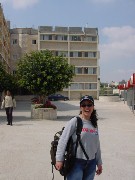 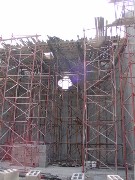 there
and delay in coming here. Wisdom in North Africa. We woke up
at
Ibillin, an Arab town northwest of
Nazareth, and got a tour around the grounds of Mar Elias School and College.
Anyone familiar with the story of Abuna Elias Chacour knows the legend
of Ibillin - an Arab priest who built a school without a permit (the Israelis
notoriously refuse there
and delay in coming here. Wisdom in North Africa. We woke up
at
Ibillin, an Arab town northwest of
Nazareth, and got a tour around the grounds of Mar Elias School and College.
Anyone familiar with the story of Abuna Elias Chacour knows the legend
of Ibillin - an Arab priest who built a school without a permit (the Israelis
notoriously refuse 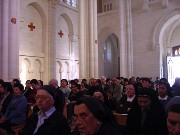 building
permits for Arabs, even if they are citizens) and avoided bulldozing orders
with a great deal of persistence, stubbornness, and and connections.
Now, it's a thriving school, with a teacher training center and college
- 4500 students in all. They are hoping to open a theological school,
but an Arab Christian school seeking accreditation faces another uphill
battle with the Israeli government - nothing new for Abuna Chacour.
In the afternoon, Marthame went with some clergy friends to attend an ecumenical
prayer service for peace in the Silesian Church of Christ the Adolescent,
overlooking Nazareth (audio - 16 sec.).
The words were familiar, but ring true nonetheless, "no peace without justice."
Bishop
Ma'allim of the Melkite Church focused on the words of Christ to his
disciples, that the peace he gives him is not as the world gives - how
poignant with the American "Johnny-come-lately" intervention here.
The now familiar Arab hymn was our refrain, "Lord, make your peace rain
down on us." We spoke with friends throughout the day. The
Arab
American University has six tanks parked near it. It's not clear
what they're doing with them. Birzeit,
near Ramallah, is building
permits for Arabs, even if they are citizens) and avoided bulldozing orders
with a great deal of persistence, stubbornness, and and connections.
Now, it's a thriving school, with a teacher training center and college
- 4500 students in all. They are hoping to open a theological school,
but an Arab Christian school seeking accreditation faces another uphill
battle with the Israeli government - nothing new for Abuna Chacour.
In the afternoon, Marthame went with some clergy friends to attend an ecumenical
prayer service for peace in the Silesian Church of Christ the Adolescent,
overlooking Nazareth (audio - 16 sec.).
The words were familiar, but ring true nonetheless, "no peace without justice."
Bishop
Ma'allim of the Melkite Church focused on the words of Christ to his
disciples, that the peace he gives him is not as the world gives - how
poignant with the American "Johnny-come-lately" intervention here.
The now familiar Arab hymn was our refrain, "Lord, make your peace rain
down on us." We spoke with friends throughout the day. The
Arab
American University has six tanks parked near it. It's not clear
what they're doing with them. Birzeit,
near Ramallah, is 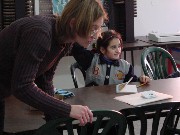 working
on relief efforts for students of their university
who are trapped in the village and away from home. Every few nights
the working
on relief efforts for students of their university
who are trapped in the village and away from home. Every few nights
the 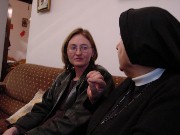 army
has come in and taken a few students before rolling out again. They
have had no school, but parents are beginning to ask Abuna Iyad to reconsider
- cabin fever is getting tough on them. Zababdeh has water and electricity.
Our friends in Jenin are safe, but without
water and electricity, and thankfully facing boredom more than anything
else. The word from Jenin Refugee Camp
is far more terrifying. Thirteen Israeli soldiers were killed in
an ambush and are asking for the intervention of the Red
Cross to retrieve their dead and wounded - ironic, some would say,
given their treatment of medical personnel over the past year and a half
(and especially over the last ten days). Nevertheless, we hope humanity
will win out over the desire for revenge. The word is, though, that
there has been a massacre in the camp, with more than a hundred dead, at
least as many seriously wounded with no access to medical care. Even
Shimon Peres is expressing fear and regret. We fear the worst.
We have had no contact with Nablus
since yesterday, and the attacks on the Old City (where our closest friends
there live) - and the resistance in it - have been fierce. This evening,
Elizabeth lent a hand at our friends' English language center, since she
hasn't had much chance to teach lately and they were busy with an American
group who has come to minister with Christian women in Nazareth.
We also had the chance to visit with Sister Alfonse (who was in Zababdeh
last year but was moved to Jaffa-Nazareth this past summer) and bring her
news from Zababdeh (as little as we have of that). army
has come in and taken a few students before rolling out again. They
have had no school, but parents are beginning to ask Abuna Iyad to reconsider
- cabin fever is getting tough on them. Zababdeh has water and electricity.
Our friends in Jenin are safe, but without
water and electricity, and thankfully facing boredom more than anything
else. The word from Jenin Refugee Camp
is far more terrifying. Thirteen Israeli soldiers were killed in
an ambush and are asking for the intervention of the Red
Cross to retrieve their dead and wounded - ironic, some would say,
given their treatment of medical personnel over the past year and a half
(and especially over the last ten days). Nevertheless, we hope humanity
will win out over the desire for revenge. The word is, though, that
there has been a massacre in the camp, with more than a hundred dead, at
least as many seriously wounded with no access to medical care. Even
Shimon Peres is expressing fear and regret. We fear the worst.
We have had no contact with Nablus
since yesterday, and the attacks on the Old City (where our closest friends
there live) - and the resistance in it - have been fierce. This evening,
Elizabeth lent a hand at our friends' English language center, since she
hasn't had much chance to teach lately and they were busy with an American
group who has come to minister with Christian women in Nazareth.
We also had the chance to visit with Sister Alfonse (who was in Zababdeh
last year but was moved to Jaffa-Nazareth this past summer) and bring her
news from Zababdeh (as little as we have of that). |
|
Wednesday, 4/10/02: Our taxi picked us up at 8:30 this morning. Since we were dealing with server problems on our website into the wee hours last night, a later start would've been welcome. Our driver also delivered the news of a suicide bombing in Haifa. It's times like this when you wish your predictions were wrong. We met up with a couple of journalist friends who were trying to get into Jenin camp (like the rest of the media world) to find out what is really happening. Our plan was to go first by way of Zababdeh so that we could deliver some milk and food to the village then send the media on its merry, dangerous way. The Jalame checkpoint was closed. Very closed - a "Closed Military Zone". Somehow that didn't apply for the handful of settlers commuting across into the West Bank...This is the first time the two of us have ever been denied entry at Jalame. 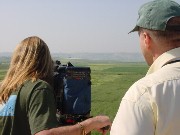 We
had hoped to spend a few hours in Zababdeh, greet people and bring some
relief, as well as taking out a few more changes of underwear. No great
loss - just frustrating. But seeing the army keep out journalists, We
had hoped to spend a few hours in Zababdeh, greet people and bring some
relief, as well as taking out a few more changes of underwear. No great
loss - just frustrating. But seeing the army keep out journalists, 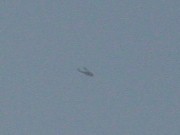 knowing
what that means, is disturbing. It is, in essence, a press blackout
- people have been able to talk by telephone with people inside Jenin,
but no one is able to see what's happening, and the military is being very
tight-lipped. We headed into a nearby Arab-Israeli village to see
if there was a back road across the Green Line - Muqeible, which has a
handful of Christians among their Muslim population, is just three miles
from Jenin, but a world away on the other side of the 1948 Cease-Fire line.
We found a dozen or so journalists, using a family's roof to get a view
of Jenin, all trying to find out what was happening. We could hear
heavy machine gun fire and could see and hear the low rumble of Cobra helicopters
overhead. We then followed the press feeding frenzy for information
- any information - to the village of Salem near Megiddo. Dozens
of tanks and armored personnel carriers lined the roads, their movement
literally shaking the ground. Again, it was a closed military area,
but the journalists found a soldier or two willing to talk. "Sure,
it's an effective campaign." "Did you hear about the bomb in Haifa?"
"Yeah, but we just need to finish. Then the bombings will stop." knowing
what that means, is disturbing. It is, in essence, a press blackout
- people have been able to talk by telephone with people inside Jenin,
but no one is able to see what's happening, and the military is being very
tight-lipped. We headed into a nearby Arab-Israeli village to see
if there was a back road across the Green Line - Muqeible, which has a
handful of Christians among their Muslim population, is just three miles
from Jenin, but a world away on the other side of the 1948 Cease-Fire line.
We found a dozen or so journalists, using a family's roof to get a view
of Jenin, all trying to find out what was happening. We could hear
heavy machine gun fire and could see and hear the low rumble of Cobra helicopters
overhead. We then followed the press feeding frenzy for information
- any information - to the village of Salem near Megiddo. Dozens
of tanks and armored personnel carriers lined the roads, their movement
literally shaking the ground. Again, it was a closed military area,
but the journalists found a soldier or two willing to talk. "Sure,
it's an effective campaign." "Did you hear about the bomb in Haifa?"
"Yeah, but we just need to finish. Then the bombings will stop." 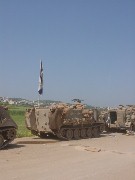 What
does that mean, "finish?" No one seems to know - there's a lot of
rhetoric about "terrorist infrastructure," but the targeting of civil infrastructure,
human rights organizations, and medical personnel, as well as the reports
of many, many civilian casualties calls all of that into question.
Then the theologians arrived - a surreal scene if there ever was, a brightly
decorated bus pulled up playing music about the Messiah (audio
- 8 sec.). A couple of Lubovitchers (hard-core Orthodox sectarians)
clambered off, eager to hand out "Messiah" flags to soldiers to put on
the tanks (since they're doing Messiah work) and "tephilim" to wear on
their heads (from Deuteronomy 6), since they protect Jews from the enemy.
There was a bizarre What
does that mean, "finish?" No one seems to know - there's a lot of
rhetoric about "terrorist infrastructure," but the targeting of civil infrastructure,
human rights organizations, and medical personnel, as well as the reports
of many, many civilian casualties calls all of that into question.
Then the theologians arrived - a surreal scene if there ever was, a brightly
decorated bus pulled up playing music about the Messiah (audio
- 8 sec.). A couple of Lubovitchers (hard-core Orthodox sectarians)
clambered off, eager to hand out "Messiah" flags to soldiers to put on
the tanks (since they're doing Messiah work) and "tephilim" to wear on
their heads (from Deuteronomy 6), since they protect Jews from the enemy.
There was a bizarre 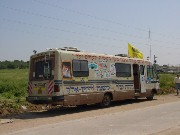 carnival
atmosphere, with people coming to hand out sweets and coffee to the soldiers.
Many were wearing Orange (the Israeli cellphone company) baseball hats
- probably part of some giveaway. The hats had "SMILE" written in big orange
letters on the front. That was both surreal and disturbing. We called a
friend in Jenin as we stood there in the
military staging ground - a nearby parking lot was full of reservists'
cars (a "Commuter War" of sorts). Our friend said that women, children,
and old people from the Refugee Camp had been told to leave the camp, while
men between 15 and 45 were told they must stay. He said that some who left
were now wandering around the city trying to find somewhere to take shelter.
But it seems that only a small fraction of people left. There's nowhere
for these refugees of 1948 to go now. Within a short time of our
arrival, both sides were saying that "the battle" was over. No reports
of how many dead, wounded, etc. We also spoke to our dear friends
in Nablus. The Anglican compound
next to the Old City has been hit hard during the fighting there.
Even so, they are staying put and laying low - they can't leave.
They finally have electricity, but still no water. As we left the
Salem checkpoint, we ran into a UN convoy headed into Jenin to deliver
relief. We followed them, but were turned back at the checkpoint
again. We made our way down to Jerusalem, where we will spend the
next few days with friends decompressing. But there is still work
to do - a journalist with the Oakland
Tribune called us tonight, working on a piece on about the situation
and relations among Palestinian Muslims and Christians. Not a political
piece, per se, but politics enters
every topic here. carnival
atmosphere, with people coming to hand out sweets and coffee to the soldiers.
Many were wearing Orange (the Israeli cellphone company) baseball hats
- probably part of some giveaway. The hats had "SMILE" written in big orange
letters on the front. That was both surreal and disturbing. We called a
friend in Jenin as we stood there in the
military staging ground - a nearby parking lot was full of reservists'
cars (a "Commuter War" of sorts). Our friend said that women, children,
and old people from the Refugee Camp had been told to leave the camp, while
men between 15 and 45 were told they must stay. He said that some who left
were now wandering around the city trying to find somewhere to take shelter.
But it seems that only a small fraction of people left. There's nowhere
for these refugees of 1948 to go now. Within a short time of our
arrival, both sides were saying that "the battle" was over. No reports
of how many dead, wounded, etc. We also spoke to our dear friends
in Nablus. The Anglican compound
next to the Old City has been hit hard during the fighting there.
Even so, they are staying put and laying low - they can't leave.
They finally have electricity, but still no water. As we left the
Salem checkpoint, we ran into a UN convoy headed into Jenin to deliver
relief. We followed them, but were turned back at the checkpoint
again. We made our way down to Jerusalem, where we will spend the
next few days with friends decompressing. But there is still work
to do - a journalist with the Oakland
Tribune called us tonight, working on a piece on about the situation
and relations among Palestinian Muslims and Christians. Not a political
piece, per se, but politics enters
every topic here. |
|
Thursday, 4/11/02: A quiet day for us. We slept in late, and spent a good part of the day reading, napping, and watching TV, hoping to recharge our physical as well as emotional batteries. We woke up to the news that the Israeli army had entered Birzeit - no luck getting in touch with Abuna Iyad, but our neighbors from the summer said that the tanks had stayed away from our summer housing. These days, if there's no tanks parked on your street, that's a good day. We also talked with an American friend stuck near Manger Square in Bethlehem. The curfew was supposed to be lifted today, but it wasn't - they're in need of milk and have tried to get some through relief convoys. However, the army has controlled the routes so tightly for the trickle of relief that she's been left out of that. Our journalist friend tried again to get into Jenin today, leaving early and coming back 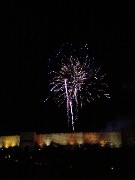 late.
Like droves of other journalists, he was refused entry by soldiers, and
failed to get in to Jenin Camp, or even
Jenin City. The Israelis report 100 dead people in the Camp; other reports
vary from 200 to 500. Without press inside, there is no way to really know.
Other reports are emerging from within the camp - if even half of it is
true, there was a slaughter there. The IDF's desire to keep the press
out has only made the world more disturbed and hungry to know. What
we do know is that people have been without electricity and water for over
a week. We spoke with a friend in Jenin city, who said the curfew was lifted
for a couple hours today. She ventured out of their home to buy candles
and batteries. She said there are no vegetables, fruit, or even flour in
the shops. Fortunately for them, her family has enough stocked aside for
the time being. Our journalist hosts, another friend, and we shared dinner
together, and we all marvelled at the news on BBC. Somehow their Middle
East correspondent got into Jenin Camp today, and our friends wondered
how on earth she did it. The report was short and disturbing, a sign of
things to come, when the Israelis finally open the camp to journalists.
Killings of unarmed civilians, refusal of medical care, humanitarian disaster.
The report also showed irritated soldiers who finally spotted and evicted
the BBC team. The UN, Red Cross, and others have been promised that
they could get into the Camp - promises that have been reneged on.
The world is waiting to learn the rest. Our evening meal was interrupted
by the loud boom - of fireworks. This week has three Israeli national
holidays. With the reports of slaughters in Jenin and the Israeli
public celebrating a "success", the frivolity seemed somewhere between
bad taste and poor timing. late.
Like droves of other journalists, he was refused entry by soldiers, and
failed to get in to Jenin Camp, or even
Jenin City. The Israelis report 100 dead people in the Camp; other reports
vary from 200 to 500. Without press inside, there is no way to really know.
Other reports are emerging from within the camp - if even half of it is
true, there was a slaughter there. The IDF's desire to keep the press
out has only made the world more disturbed and hungry to know. What
we do know is that people have been without electricity and water for over
a week. We spoke with a friend in Jenin city, who said the curfew was lifted
for a couple hours today. She ventured out of their home to buy candles
and batteries. She said there are no vegetables, fruit, or even flour in
the shops. Fortunately for them, her family has enough stocked aside for
the time being. Our journalist hosts, another friend, and we shared dinner
together, and we all marvelled at the news on BBC. Somehow their Middle
East correspondent got into Jenin Camp today, and our friends wondered
how on earth she did it. The report was short and disturbing, a sign of
things to come, when the Israelis finally open the camp to journalists.
Killings of unarmed civilians, refusal of medical care, humanitarian disaster.
The report also showed irritated soldiers who finally spotted and evicted
the BBC team. The UN, Red Cross, and others have been promised that
they could get into the Camp - promises that have been reneged on.
The world is waiting to learn the rest. Our evening meal was interrupted
by the loud boom - of fireworks. This week has three Israeli national
holidays. With the reports of slaughters in Jenin and the Israeli
public celebrating a "success", the frivolity seemed somewhere between
bad taste and poor timing. |
|
Friday, 4/12/02: The reports coming out of Jenin are growing more disturbing almost in proportion to the resolve of human rights' workers and the media to get in and learn the full story. We met up with a friend today in the Old City of Jerusalem to have lunch. He studies at Hebrew University, but this summer we got to know him while we were studying Arabic together at Birzeit University. He still tries to maintain contacts on both sides of the Green Line, a more and more difficult prospect these days. He spoke with his roommates from Birzeit and learned that his summer quarters had been severely damaged by Israeli explosives - just around the corner from our summer quarters. He is finding himself more and more unwelcome among many Jewish colleagues at the Hebrew University, too, as the situation gets more and more entrenched. As Israeli society collectively takes a big step to the right, he (essentially a moderate) is being branded a radical. The student union at the university has voted to exclude Arab Israeli groups because they are too political and because they are organizing relief efforts for people in the West Bank and Gaza (those who would compare Arafat to Bin Laden would do well to remember that the Americans at least worked on getting relief into Afghanistan). As we came back to our temporary dwellings (we've been introducing ourselves to people as "Jenin-area refugees" - theme music courtesy of Tom Petty - 5 sec.), we sat back down to our work and MTV's mind-melting music videos (theme music courtesy of Shakira - 2 sec.). Mid-afternoon, we heard a loud bang echoing off the Old City walls, then the sound of helicopters and lots and lots of ambulances. We turned on the news to discover that our fears were not unfounded - a suicide bomber on a bus in West Jerusalem. The fourth young Palestinian woman in the last few months to take her life and the lives of those around her. That, combined with the apparent massacre in Jenin, makes an ominous welcome for Powell who has an almost insurmountable task in front of him. The right-wing radical nationalism and unfettered military assault of Israel and the desperate radical anger and violence of Palestine are colliding, and lucky Colin gets to step into the middle. We shared dinner with friends in the media and diplomatic fields. Some diplomatic staff went into Nablus today to bring desperately-needed supplies to their dual-status citizens. While these nations treat their citizens as equal in the eyes of the law, the Israelis do not grant them the same status - thus they are stuck under the same collective punishment as everyone else there. These staff were bringing water. Water to European citizens trapped in their homes, unable to leave because Israel does not recognize their European citizenship. The toll of destruction they witnessed in Nablus, particularly the Old City, sounded just so sad. So very sad. It's really hard to hear about and see (on the TV) cities that we love getting ripped to shreds. |
|
Saturday, 4/13/02: Shabbat Shalom. We were able to rest today and get some emotional distance from the troubles, something that's long overdue. But politics is never far from anyone's mind here. Journalists are still trying to get into Jenin Camp, so the Israeli army has expanded their curfew control over neighboring Burqin. There was also a large protest at Salem checkpoint today by Arab and Jewish Israeli peace activists. All eyes are on Powell's mission impossible (theme music courtesy of TV - 3 sec.). Friends in Nablus had the curfew lifted for the first time in ten days, just enough time to look into the damage. One friend who lives in the Anglican compound (by the Old City) returned to find all of her windows blown out. She's been staying and working in the Anglican hospital since the Israeli invasion. |
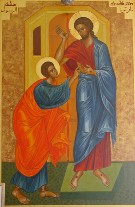 Sunday,
4/14/02: Happy Birthday, Mom (your son didn't forget - check's
in the mail). We headed early this morning towards Damascus Gate
to the Syrian Catholic Patriarchate and the church of St. Thomas for worship.
Abuna William from the Latin Patriarchate officiated, since the Syrian
Catholic parish priest is stuck with his other parish in Bethlehem - members
of that community have taken refuge in the Syrian Catholic Convent.
There is a marked difference in liturgy between the two rites, but because
a Latin Rite priest was officiating the only difference was the recitation
of the Lord's Prayer - done in ancient Syriac. Normally, there would
be much less Arabic than there was today. After church we were supposed
to go to Zababdeh at least to see some folks, drop off some goods, and
grab a few more things - it was winter when we left, and now it's approaching
summer weather. However, our driver decided that with the news from
Jenin that today was not a day to go. Instead, we visited with a
friend from Zababdeh Sunday,
4/14/02: Happy Birthday, Mom (your son didn't forget - check's
in the mail). We headed early this morning towards Damascus Gate
to the Syrian Catholic Patriarchate and the church of St. Thomas for worship.
Abuna William from the Latin Patriarchate officiated, since the Syrian
Catholic parish priest is stuck with his other parish in Bethlehem - members
of that community have taken refuge in the Syrian Catholic Convent.
There is a marked difference in liturgy between the two rites, but because
a Latin Rite priest was officiating the only difference was the recitation
of the Lord's Prayer - done in ancient Syriac. Normally, there would
be much less Arabic than there was today. After church we were supposed
to go to Zababdeh at least to see some folks, drop off some goods, and
grab a few more things - it was winter when we left, and now it's approaching
summer weather. However, our driver decided that with the news from
Jenin that today was not a day to go. Instead, we visited with a
friend from Zababdeh 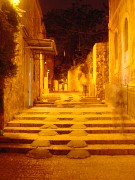 staying
with her family in Beit Hanina, just outside Jerusalem. They have
the benefit of having Jerusalem IDs (kind of a second-rate Israeli citizen
status), but because our friend moved to Zababdeh, her children's status
is in question if not in jeopardy. Since the annexation of Jerusalem
by Israel, the municipality has been notorious for its overzealous revoking
of Jerusalemite status for Arabs. In any case, for us it meant another
day on the lam. We made our bed at our favorite hostel near Damascus
Gate which has become a sort of staging ground for the growing international
solidarity movements and for freelance budget journalists trying to uncover
what's happening in the "Closed Military Zones". We spent a great
deal of time wondering about what it is exactly that we're doing
here. There's no school in Zababdeh, so teaching there isn't an option.
There's no telephone, so even if we decided to stay out of solidarity in
the relative quiet of the village, we couldn't communicate with the outside
world - something with which our parents would no doubt take issue.
We can write, but feel like frustrated by the collective silence (or is
it horror and thus silenced shock?) that the world seems to be expressing
at the situation here. We could leave, and go on a speaking tour,
but that simply feels like abandonment. We took a walk in the Old
City to grab dinner and to re-evaluate - perhaps we were hoping that the
empty streets would be symbolic of clearing our minds. It helped,
no doubt. But this will require much discernment and prayer. staying
with her family in Beit Hanina, just outside Jerusalem. They have
the benefit of having Jerusalem IDs (kind of a second-rate Israeli citizen
status), but because our friend moved to Zababdeh, her children's status
is in question if not in jeopardy. Since the annexation of Jerusalem
by Israel, the municipality has been notorious for its overzealous revoking
of Jerusalemite status for Arabs. In any case, for us it meant another
day on the lam. We made our bed at our favorite hostel near Damascus
Gate which has become a sort of staging ground for the growing international
solidarity movements and for freelance budget journalists trying to uncover
what's happening in the "Closed Military Zones". We spent a great
deal of time wondering about what it is exactly that we're doing
here. There's no school in Zababdeh, so teaching there isn't an option.
There's no telephone, so even if we decided to stay out of solidarity in
the relative quiet of the village, we couldn't communicate with the outside
world - something with which our parents would no doubt take issue.
We can write, but feel like frustrated by the collective silence (or is
it horror and thus silenced shock?) that the world seems to be expressing
at the situation here. We could leave, and go on a speaking tour,
but that simply feels like abandonment. We took a walk in the Old
City to grab dinner and to re-evaluate - perhaps we were hoping that the
empty streets would be symbolic of clearing our minds. It helped,
no doubt. But this will require much discernment and prayer. |
|
Monday, 4/15/02: A friend of ours has an expression for coordinating efforts among journalists in the heat of a breaking story: "herding cats," he calls it. The hostel's DIY photographers and other freelancers were trying to herd themselves up to Jenin, now that the Israeli army has lifted the strict closure. Four days has been enough for the army to complete something there; we still wait to learn exactly what that "something" is. In the meantime, we were herding cats on our trip back to Zababdeh. We found a Jerusalem taxi willing to take us most of the way up to Tayasir. We picked up our friend in Beit Hanina and headed along the Jordan Valley road. Amazing to see how much new building - both militarily and settlement-wise - there's been since the last time we drove this road. We passed two checkpoints with soldiers who were quite friendly. The third one was just bemused, but let us pass anyway. We were picked up in a Palestinian taxi on the other side and arrived in Zababdeh. It was very, very good to be home and to see our friends there. We had left so quickly that we hadn't had a chance to explain our departure, so we began to make the rounds. As we walked around, folks were happily greeting us, welcoming us home. And so it took a while to get to our first stop, with Abuna Aktham. We conferred about what we can do in the foreseeable future. We decided together that it would be best if we mostly stay outside Zababdeh, but close enough to help bring things in, get things out, and be a communication link to the outside world. Depending on what we're able to get done today, we'll probably head out tomorrow. The most frustrating thing is not being able to check e-mail, but that seems fairly superficial right now. Everyone here is afraid. Many men are staying awake at night and sleeping during the day to be vigilant in case the army enters. The school is struggling with what to do - recognizing that things are relatively good here, but not wanting to have a curfew imposed with 500 kids stuck at the Latin Convent. 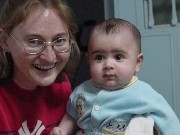 When
the tanks passed through Zababdeh a week or so ago, everyone from the village
fled to the Latin Convent, seeking shelter and sanctuary. Fortunately,
it wasn't necessary, but the images of men being rounded up and the absolute
carnage - in terms of both people and property - in other places has effectively
frightened the population. In that sense, the military operation
is a success. But in terms of future prospects, people are very angry
and have little hope for a solution. And while it's good to be here,
it's hard to hear their stories, too. The school has been affected
indirectly by the recent attacks in the area. One of our seniors
lost an aunt in the Jenin Camp destruction. We've had no word from
teachers and students in Qabatiya, so we don't know how we've been affected
there. The house that was rocketed in Tubas
was in the Christian quarter, killing six occupants. It's all hitting
very close. We also ran up to the University
for a quick visit with the foreigners, most of whom have stuck around.
It was great to see them, but they were heavy-heated too. They know
at least one of their students has been killed. Watching the news,
as most of it drifts away to the diplomatic front and Sharon's and Arafat's
new promises, is nothing short of depressing. On the bright side,
there's nothing like seeing a friend's new baby to ease the helplessness
a bit. When
the tanks passed through Zababdeh a week or so ago, everyone from the village
fled to the Latin Convent, seeking shelter and sanctuary. Fortunately,
it wasn't necessary, but the images of men being rounded up and the absolute
carnage - in terms of both people and property - in other places has effectively
frightened the population. In that sense, the military operation
is a success. But in terms of future prospects, people are very angry
and have little hope for a solution. And while it's good to be here,
it's hard to hear their stories, too. The school has been affected
indirectly by the recent attacks in the area. One of our seniors
lost an aunt in the Jenin Camp destruction. We've had no word from
teachers and students in Qabatiya, so we don't know how we've been affected
there. The house that was rocketed in Tubas
was in the Christian quarter, killing six occupants. It's all hitting
very close. We also ran up to the University
for a quick visit with the foreigners, most of whom have stuck around.
It was great to see them, but they were heavy-heated too. They know
at least one of their students has been killed. Watching the news,
as most of it drifts away to the diplomatic front and Sharon's and Arafat's
new promises, is nothing short of depressing. On the bright side,
there's nothing like seeing a friend's new baby to ease the helplessness
a bit. |
|
Tuesday, 4/16/02: We decided to stay in Zababdeh an extra day. It has been a week since we last saw everybody, and it was good to reconnect - one day wasn't enough to do it justice. Neither, we suspect, will two days. Apparently the generator is low on diesel fuel - about enough for four more days. A new tank of fuel costs $5000, which the Municipality doesn't have right now. They don't have it because nobody is able to pay their electricity bills because there's no work. In order to save, they've been keeping the fuel-usage down by leaving it off between 5 and 11 AM, so the sleepy little town is even sleepier these days. 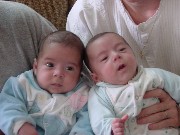 We
had begun making our visiting rounds in earnest and stopped for lunch at
friends who have new twins in the house. Their father is living and
working in the Galilee, so we will bring him pictures when we see him sometime
next week. They were showing off the spot on their roof where they
can get spotty cellphone service (just what every home needs!) when we
spied five tanks on the main road near the Israeli training camp.
That was about this time that we began to regret staying here an extra
day. There was some exchange of gunfire in the distance, but we're
still unable to tell whose guns are whose. But there was no mistaking
the firing of the tank. We had just sat down to lunch, when a sound
shattered the air and shook the foundations of the village - or so it seemed.
The electricity cut out at the exact same moment. Everyone gasped
and hunched over. We
had begun making our visiting rounds in earnest and stopped for lunch at
friends who have new twins in the house. Their father is living and
working in the Galilee, so we will bring him pictures when we see him sometime
next week. They were showing off the spot on their roof where they
can get spotty cellphone service (just what every home needs!) when we
spied five tanks on the main road near the Israeli training camp.
That was about this time that we began to regret staying here an extra
day. There was some exchange of gunfire in the distance, but we're
still unable to tell whose guns are whose. But there was no mistaking
the firing of the tank. We had just sat down to lunch, when a sound
shattered the air and shook the foundations of the village - or so it seemed.
The electricity cut out at the exact same moment. Everyone gasped
and hunched over. 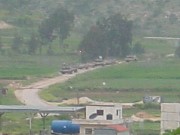 No
one could really tell what was happening because everyone was too scared
to go out or back up to the roof or even peek out the window. In the course
of the next few hours, there was sporadic gunfire and two more tank shells.
Their sound is reminiscent of a sonic boom in your living room. No
one was without fear, though everyone tried to reassure each other - and
especially the children - that nothing was wrong at all. The men
all began joking about stripping down to their underwear and making their
way to the Convent - like the scenes that have been repeated around the
West Bank the past few weeks. We were trying to imagine what it's
been like for people in Ramallah, Bethlehem, Nablus, and Jenin who have
endured not just a mere handful of tank shells but hundreds upon hundreds,
24-7. One was enough to send us running and ducking under the covers
(so to speak). Eventually the collective "military wisdom" of the
village discerned that the tanks had headed off to nearby Misilye and had
left Zababdeh. The rest of the day, as we wandered around the village
(but never too far from the apartment after that), several things were
immediately evident. First was that living under this military Occupation
is emotionally and physically draining. Everyone looked wiped out
and had short fuses, and quite a few people are fighting colds. The
other thing is that people are afraid. Everyone's trying to guess
what'll happen next, and many are assuming that the Israelis will eventually
do house-to-house searches in Zababdeh. In the afternoon, many families
on the outskirts of town were relocating to stay with relatives in locations
that are considered safer. Some are talking about sleeping in the
Latin Convent tonight. The elders of the village were reminding Abuna
Aktham to have his robe ready to wear when the soldiers came and gathered
the men. The now steady and familiar sound of F-16s overhead adds
to the paranoia and fear which just seems to feed itself. We dropped
off some relief support from the Sunday School children of Park
Ridge Presbyterian and First
Presbyterian of Wilmette - something sorely needed these days - and
vowed that we will definitely head back to Nazareth tomorrow. No
one could really tell what was happening because everyone was too scared
to go out or back up to the roof or even peek out the window. In the course
of the next few hours, there was sporadic gunfire and two more tank shells.
Their sound is reminiscent of a sonic boom in your living room. No
one was without fear, though everyone tried to reassure each other - and
especially the children - that nothing was wrong at all. The men
all began joking about stripping down to their underwear and making their
way to the Convent - like the scenes that have been repeated around the
West Bank the past few weeks. We were trying to imagine what it's
been like for people in Ramallah, Bethlehem, Nablus, and Jenin who have
endured not just a mere handful of tank shells but hundreds upon hundreds,
24-7. One was enough to send us running and ducking under the covers
(so to speak). Eventually the collective "military wisdom" of the
village discerned that the tanks had headed off to nearby Misilye and had
left Zababdeh. The rest of the day, as we wandered around the village
(but never too far from the apartment after that), several things were
immediately evident. First was that living under this military Occupation
is emotionally and physically draining. Everyone looked wiped out
and had short fuses, and quite a few people are fighting colds. The
other thing is that people are afraid. Everyone's trying to guess
what'll happen next, and many are assuming that the Israelis will eventually
do house-to-house searches in Zababdeh. In the afternoon, many families
on the outskirts of town were relocating to stay with relatives in locations
that are considered safer. Some are talking about sleeping in the
Latin Convent tonight. The elders of the village were reminding Abuna
Aktham to have his robe ready to wear when the soldiers came and gathered
the men. The now steady and familiar sound of F-16s overhead adds
to the paranoia and fear which just seems to feed itself. We dropped
off some relief support from the Sunday School children of Park
Ridge Presbyterian and First
Presbyterian of Wilmette - something sorely needed these days - and
vowed that we will definitely head back to Nazareth tomorrow. |
|
Wednesday, 4/17/02: Fled. After a couple last-minute visits, we grabbed our morning taxi and headed off, loaded down with the essentials we'd need for the next few months, including our upcoming trips and our summer trip home (we're planning on getting back to Zababdeh at least once, but you never know). We took the roundabout journey past the University and through several nearby villages before our driver dropped us off in Jalame. Laden with backpacks, bags and sacks, we walked up the road towards the checkpoint, a few military vehicles making up the sparse traffic. We could see the soldiers at the checkpoint wondering what this strange sight was. We called out from a distance, "Hi! Good morning!" "Stop right there." (we did) "Put all of your bags down." (we did) "What are you doing here? Where are you coming from? Where are you going? You - come here with the IDs." (he did) One of the soldiers took our passports and called into whatever HQ is responsible while the other chatted with Marthame. A reservist, the soldier had been called up and had been stationed at the checkpoint recently. He said they didn't know about any foreigners in the area, nor any Christians for that matter. He was quite friendly. They got the OK that we could go ahead and pass through (we've been denied entry, but never exit, so the fact that we now needed permissions was something quite strange), but informed us we wouldn't be allowed back in - at least not in the next few days. Military orders change every few minutes and even within the change of command - so we've noticed, and so we've learned from friends in the army. Then there was a cursory search of all of our bags, accompanied by the somewhat apologetic and now-familiar phrase of "sorry, we have to do this - we're just following orders." We arrived at our friends' place in Nazareth and got back on-line for the first time in a few days (158 messages waiting - most of them encouraging, some challenging, a handful nasty). Given the stress of today and yesterday, that was about all we could accomplish. We're not sure when we can return to Zababdeh, but it may be a long time.... |
|
Thursday, 4/18/02: Happy Birthday, Dad (check's still in the mail...). Not much to report on today - such is the advantage of leaving behind the tank shells and checkpoints of the West Bank for the relative tranquility of the Galilee. We were able to take care of some errands for folks in the village and at the University who have less mobility than we do these days. We also checked in with a friend in Ramallah. Yesterday they were the lucky recipients of the house-to-house search sweepstakes. Fortunately, there was little to report - they and their kids were just a bit traumatized by the whole experience. Even without the violence and theft which has accompanied some searches, having soldiers and automatic weapons in your house doesn't instill calm. We've also begun arranging our summer schedule - trying to find a balance between doing talks and enjoying some much-needed rest and time with our families. |
|
Friday, 4/19/02: Another day at the ranch. Today we made calls, wrote, and worked on our summer plans. We checked in with friends in Bethlehem, who are living very close to the Church of the Nativity. They can't get any sleep because Israeli forces have begun blasting noise (screeching, screaming) at the Church, where a couple hundred people remain holed up. A kind of psychological warfare that is taking its toll on our friends and their two kids. In Birzeit, the Latin Patriarchate School re-opened two days ago. We touched base with Abuna Iyad, who was anxious for news from Zababdeh - not only do they have many students at Birzeit University who are from Zababdeh, but he and Abuna Aktham are dear friends. It so happens that Abuna Aktham had just called, using his cellphone up at the Arab-American University to touch base with us. It was good to hear his voice and his persistent sense of humor. In the afternoon, we received a call from a friend, a Korean Presbyterian missionary (and elder at St. Andrew's Church of Scotland in Jerusalem) who runs a kindergarten in Bethlehem. He and his wife and two kids have been ithere for ten years - something we greatly respect, seeing how hard this place can be to live in. They fled just before the most recent incursion, and, like us, have been going from place to place waiting to go back home. There's a restlessness that accompanies moving around so frequently and relying on the good graces of friends. They've got the additional burden of two children having to go through this, but better that than the continued hardships of Bethlehem. Their kindergarten has experienced minor damage - shattered windows from the war noises, a knocked-down front gate, cars outside crushed under the wheels of tanks. They've come to the Galilee for a few days both to get away and to get to know some of our connections - particularly the Presbyterian ones - here. This place can be so bizarrely insular - Bethlehem is one universe, Jerusalem another, and the Galilee yet another (Zababdeh falls through the cracks again). We'd hoped to rent a car, but discovered that we can't do so because our credit card has expired, and the new one is stuck somewhere between Lubbock and Zababdeh. We're trying to arrange an emergency replacement (and getting a courier to deliver to an address with no street or apartment number). We'll see. It would beat the fearful uncertainty of busses (which we've avoided) and the extravagance of taxis (which have become our chariots). |
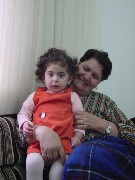 Saturday,
4/20/02: Today we got an invitation to return to Kufr
Yasif, an Arab-Israeli village in the Galilee. We have gotten
to know a family there through our good friend Rev. Dr. Fahed Abu-Akel
who might be the next moderator of the Presbyterian
Church (USA). Saturday,
4/20/02: Today we got an invitation to return to Kufr
Yasif, an Arab-Israeli village in the Galilee. We have gotten
to know a family there through our good friend Rev. Dr. Fahed Abu-Akel
who might be the next moderator of the Presbyterian
Church (USA). 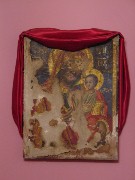 Since
we don't have a car, and Arab hospitality being what it is, they came all
the way to Nazareth to pick us up - a good hour one way. We spent
most of the day with the family, visiting with them and sharing a delicious
meal and lots of coffee and fruit. They also showed their video of
their trip to Atlanta and Washington, DC - what a treat to see home!
We were hoping to spend a few days with them, including going to church
with them tomorrow morning, but our credit card "emergency" will require
us to be "home" tomorrow to receive the replacement, due to arrive sometime
between 9 and 5. We headed over to the three-hundred year-old Kufr
Yasif Orthodox Church of St. George (most Orthodox churches are "St. George"
in this part of the world), running into some friends from Jerusalem by
chance. It's a most impressive structure - the church itself has
the appearance of antiquity, but it appears in good shape, clearly it's
been lovingly refurbished. However, it is far too small for the parish's
2000-some members, most of whom have to sit in the outside courtyard during
Sunday services. And so Abuna Atallah, a native son of Kufr Yasif,
is building a new church, as well as a school building which will accomodate
about five hundred students next fall. Currently he's also helping
to spearhead a drive to bring some relief into the Jenin area. We
wished we could stay and worship with him and the community tomorrow morning,
but Nazareth calls. Despite our pleas to take a taxi back, our hosts
brought us all the way home. We promised to return soon. Since
we don't have a car, and Arab hospitality being what it is, they came all
the way to Nazareth to pick us up - a good hour one way. We spent
most of the day with the family, visiting with them and sharing a delicious
meal and lots of coffee and fruit. They also showed their video of
their trip to Atlanta and Washington, DC - what a treat to see home!
We were hoping to spend a few days with them, including going to church
with them tomorrow morning, but our credit card "emergency" will require
us to be "home" tomorrow to receive the replacement, due to arrive sometime
between 9 and 5. We headed over to the three-hundred year-old Kufr
Yasif Orthodox Church of St. George (most Orthodox churches are "St. George"
in this part of the world), running into some friends from Jerusalem by
chance. It's a most impressive structure - the church itself has
the appearance of antiquity, but it appears in good shape, clearly it's
been lovingly refurbished. However, it is far too small for the parish's
2000-some members, most of whom have to sit in the outside courtyard during
Sunday services. And so Abuna Atallah, a native son of Kufr Yasif,
is building a new church, as well as a school building which will accomodate
about five hundred students next fall. Currently he's also helping
to spearhead a drive to bring some relief into the Jenin area. We
wished we could stay and worship with him and the community tomorrow morning,
but Nazareth calls. Despite our pleas to take a taxi back, our hosts
brought us all the way home. We promised to return soon. |
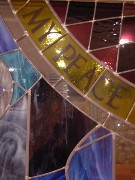 Sunday,
4/21/02: "Stay awake..." We spent the whole day waiting
for UPS Israel to deliver our replacement credit card - we were given the
precise time of "between 9 and 5." Knowing that UPS was trying to
find an apartment with no number in a building with no address on a street
with no name, we decided to wait by the window for a spotting. Around
lunchtime, our Korean Presbyterian friends from Bethlehem joined us for
some lunch and some waiting. While the Israelis have pulled back
to the borders of Nablus and Jenin, Bethlehem has stayed under intense
siege - especially the area around their Kindergarten. It has clearly
had its affect on them; they're as worried as we are about friends left
behind. We checked up on a friend in Jenin, who thankfully told us
that they have electricity and water again. We got a call at 5:30 - the
UPS driver was in town, but wasn't sure how to find us. An Arab shopkeeper
downstairs guided him in Hebrew to the building, and we did a little victory
dance. It's the small gains that keep us sane. Then we headed
off to worship at the Anglican Hospital in Nazareth. Every Sunday
evening, they gather for English-language worship, a simple service of
prayer, singing, and reflection. Among the prayer requests shared
were the needs of the thirty-some patients of the hospital from the Jenin
Camp. Among them are seven who went without dialysis for the
last couple weeks, one of whom will likely die. These people were
snuck out of Jenin through the hills by doctors and medical staffers concerned
about their condition. They were turned away from several hospitals before
they found unconditional acceptance from the Anglicans. The Scripture
passage from John, "I am the gate," seems that much more appropriate... Sunday,
4/21/02: "Stay awake..." We spent the whole day waiting
for UPS Israel to deliver our replacement credit card - we were given the
precise time of "between 9 and 5." Knowing that UPS was trying to
find an apartment with no number in a building with no address on a street
with no name, we decided to wait by the window for a spotting. Around
lunchtime, our Korean Presbyterian friends from Bethlehem joined us for
some lunch and some waiting. While the Israelis have pulled back
to the borders of Nablus and Jenin, Bethlehem has stayed under intense
siege - especially the area around their Kindergarten. It has clearly
had its affect on them; they're as worried as we are about friends left
behind. We checked up on a friend in Jenin, who thankfully told us
that they have electricity and water again. We got a call at 5:30 - the
UPS driver was in town, but wasn't sure how to find us. An Arab shopkeeper
downstairs guided him in Hebrew to the building, and we did a little victory
dance. It's the small gains that keep us sane. Then we headed
off to worship at the Anglican Hospital in Nazareth. Every Sunday
evening, they gather for English-language worship, a simple service of
prayer, singing, and reflection. Among the prayer requests shared
were the needs of the thirty-some patients of the hospital from the Jenin
Camp. Among them are seven who went without dialysis for the
last couple weeks, one of whom will likely die. These people were
snuck out of Jenin through the hills by doctors and medical staffers concerned
about their condition. They were turned away from several hospitals before
they found unconditional acceptance from the Anglicans. The Scripture
passage from John, "I am the gate," seems that much more appropriate... |
|
Monday, 4/22/02: After yesterday's thrilling saga of window-gazing, getting outside was the first highlight of the day. The second highlight was securing a car for the next month - getting around without one can be quite a challenge (in the West Bank, having a car seems to be the liability, since most roads are unnavigable). We headed back up to Ibillin to have a look at Mar Elias College. 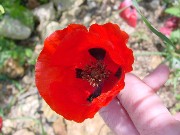 The
new building which will house a church in addition to the new school of
theology (eventually) is progressing nicely. In addition to the lovely
poppies (which have a cross pattern on their petals), we could see the
current school in all its chaotic glory - 5000 students heading home in
busses to the villages around Ibillin. We took care of some errands
for folks back in Zababdeh and talked both with Abuna Aktham (the Latin
priest) and Father Hossam (the Anglican priest). Palestinian cellphones
are now back and working in the northern West Bank, which is a big relief
for communication. School started up again yesterday at the Latin
School, which is also a big relief for parents and their cabin fever.
Still no land lines for the telephone, but shway shway (little by
little). Fr. Hossam isn't able to get to Zababdeh and was glad we
were in the Galilee. The Anglican compound in Nablus,
next to the Old City, sustained a great deal of damage. But fortunately,
the people within are all safe and sound. While he was leading Mass
recently, the Israeli soldiers came and informed him that they needed to
search the premises. But they were willing to wait until after the
Mass. They were quite polite, he related. While in the Galilee,
we were able to see our dear friend from Zababdeh. He has hopes of
finishing up the Melkite ordination process, but in the meantime, he's
spent two months doing construction work instead. With such desperate times
and high unemployment, he's lucky to have work at all. He related
that he feels God put him here prior to the most recent incursions like
God sent Joseph to Egypt as a slave prior to the famine in Canaan.
This way, despite his limited means, he can help provide some relief for
his family in the Jenin area. We also met up with dear friends who
are working at Mar Elias College. Marthame is probably going to do
some teaching in their theology school next year, which could be quite
interesting. We shared an interesting and personal theological discussion.
The school at Mar Elias has the potential to be the crucible for some incredible
contextual theology for the world. This place is certainly the focus
of world attention, and it is also the front-line of the clash of civilizations
taking place. While academics in the West may know Greek philosophy,
there is a dearth in knowledge of Arabic thought. And while Western
Christian seminarians may study Catholic and Protestant theologies, Orthodoxy
barely registers on the map. Scratching the surface of so many schools
of thought and practice here immediately sends one into important discussions:
Zionism contains elements of Nietzsche's thought; Palestinian "martyrdom"
is a version of child sacrifice; the Church's emphasis on "peace" has strayed
from the centrality of the cross. It's exciting to explore, and we
hope to do more of that. The
new building which will house a church in addition to the new school of
theology (eventually) is progressing nicely. In addition to the lovely
poppies (which have a cross pattern on their petals), we could see the
current school in all its chaotic glory - 5000 students heading home in
busses to the villages around Ibillin. We took care of some errands
for folks back in Zababdeh and talked both with Abuna Aktham (the Latin
priest) and Father Hossam (the Anglican priest). Palestinian cellphones
are now back and working in the northern West Bank, which is a big relief
for communication. School started up again yesterday at the Latin
School, which is also a big relief for parents and their cabin fever.
Still no land lines for the telephone, but shway shway (little by
little). Fr. Hossam isn't able to get to Zababdeh and was glad we
were in the Galilee. The Anglican compound in Nablus,
next to the Old City, sustained a great deal of damage. But fortunately,
the people within are all safe and sound. While he was leading Mass
recently, the Israeli soldiers came and informed him that they needed to
search the premises. But they were willing to wait until after the
Mass. They were quite polite, he related. While in the Galilee,
we were able to see our dear friend from Zababdeh. He has hopes of
finishing up the Melkite ordination process, but in the meantime, he's
spent two months doing construction work instead. With such desperate times
and high unemployment, he's lucky to have work at all. He related
that he feels God put him here prior to the most recent incursions like
God sent Joseph to Egypt as a slave prior to the famine in Canaan.
This way, despite his limited means, he can help provide some relief for
his family in the Jenin area. We also met up with dear friends who
are working at Mar Elias College. Marthame is probably going to do
some teaching in their theology school next year, which could be quite
interesting. We shared an interesting and personal theological discussion.
The school at Mar Elias has the potential to be the crucible for some incredible
contextual theology for the world. This place is certainly the focus
of world attention, and it is also the front-line of the clash of civilizations
taking place. While academics in the West may know Greek philosophy,
there is a dearth in knowledge of Arabic thought. And while Western
Christian seminarians may study Catholic and Protestant theologies, Orthodoxy
barely registers on the map. Scratching the surface of so many schools
of thought and practice here immediately sends one into important discussions:
Zionism contains elements of Nietzsche's thought; Palestinian "martyrdom"
is a version of child sacrifice; the Church's emphasis on "peace" has strayed
from the centrality of the cross. It's exciting to explore, and we
hope to do more of that. |
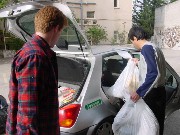 Today
we ran errands and prepared to return to Zababdeh tomorrow. Marthame spent
most of the day running Zababdeh-related errands. Entering shops in Israel
means becoming accustomed to the search of whatever it is that you're carrying,
as well as the question, "Do you have a weapon?" Elizabeth finished
grading her mid-terms, which she gave her seventh-graders on April Fool's
Day, the last day of school before the current crisis. Abuna Aktham told
us that school has reopened, with the students and teachers who are able
to come. We look forward very much to seeing all of them tomorrow.
We talked briefly with one of the school's tawjihi (high school senior)
students in Jenin. He told us that his cousin was shot and killed from
helicopter fire. "That's life," he said. Actually, it's just the
opposite, but it certainly is par for the course in this place, and very
hard to stand. He said the road from Jenin to Zababdeh is still too
dangerous, so he's still missing school: that's nearly four weeks now,
in addition to four weeks in December. We returned to Shefa'amer,
where Abuna Nadeem and the Melkite parish have collected food and clothes
for the West Bank. We packed as much baby formula, rice, oil, flour, sugar,
and other non-perishables as we could fit in our rental car, hoping to
return soon to bring another load into Zababdeh next week. We also visited
Mar Elias College in Ibillin, and had
a chance to sit with Abuna Elias Chacour, who just returned from Europe.
We shared news from Zababdeh with him, and shared embarrassment at Bush's
description of Sharon as "a man of peace" - "a man of pieces," Abuna noted.
Probably more accurate. Today
we ran errands and prepared to return to Zababdeh tomorrow. Marthame spent
most of the day running Zababdeh-related errands. Entering shops in Israel
means becoming accustomed to the search of whatever it is that you're carrying,
as well as the question, "Do you have a weapon?" Elizabeth finished
grading her mid-terms, which she gave her seventh-graders on April Fool's
Day, the last day of school before the current crisis. Abuna Aktham told
us that school has reopened, with the students and teachers who are able
to come. We look forward very much to seeing all of them tomorrow.
We talked briefly with one of the school's tawjihi (high school senior)
students in Jenin. He told us that his cousin was shot and killed from
helicopter fire. "That's life," he said. Actually, it's just the
opposite, but it certainly is par for the course in this place, and very
hard to stand. He said the road from Jenin to Zababdeh is still too
dangerous, so he's still missing school: that's nearly four weeks now,
in addition to four weeks in December. We returned to Shefa'amer,
where Abuna Nadeem and the Melkite parish have collected food and clothes
for the West Bank. We packed as much baby formula, rice, oil, flour, sugar,
and other non-perishables as we could fit in our rental car, hoping to
return soon to bring another load into Zababdeh next week. We also visited
Mar Elias College in Ibillin, and had
a chance to sit with Abuna Elias Chacour, who just returned from Europe.
We shared news from Zababdeh with him, and shared embarrassment at Bush's
description of Sharon as "a man of peace" - "a man of pieces," Abuna noted.
Probably more accurate. |
|
Wednesday, 4/24/02: Early in the morning, we headed home. We had the rental car packed (and loaded down) with supplies (rice, corn oil, flour, baby formula, etc.) for Zababdeh and headed towards the Jalame checkpoint. The number of soldiers hanging around and loading tanks onto huge flatbed trucks gives some credence to the "pull-out" - at least in this area. We spoke with one of the soldiers, who was quite friendly and helpful, and after a bit of bureacracy (and after we explained that the rental car would stay at the checkpoint - our rental agent would have a heart attack otherwise), we passed. We arrived via taxi to Zababdeh in time to unload the food and goods at the Latin Convent just before school let out. School has returned, but not at full schedule - in the abbreviated shool day, students have been studying the "foundation" courses (English, Arabic, sciences, math). 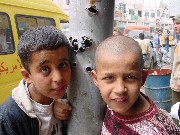 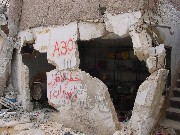 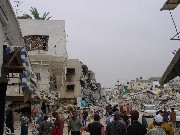 We
spoke with one of our friends at the Arab-American
University of Jenin who was coordinating student volunteer work within
Jenin Camp and invited us along. We met up with them in Jenin itself,
which looks like the Camp did a month ago.
Every building along the roads near the Camp is pock-marked with bullet
holes. Lamp stands and electricity poles are hunched over at 90 degree
angles. We actually saw a few policemen (quite a shock), but they
weren't carrying guns anymore - only batons. "See how civilized we've
become?" quiped a friend. "Just like British Constables." The air
was thick with dust, most of it coming from the direction of the Camp.
We arrived there soon after. As much as we've seen on TV and in newspapers,
nothing really prepared us for the panorama of destruction (video
- 39 sec.). We walked up what once had been narrow roads, where street-level
homes and businesses were smashed open to make room for tanks. People
were picking through rubble, and we saw journalists and Palestinian Red
Crescent/Red Cross workers here and there. We
spoke with one of our friends at the Arab-American
University of Jenin who was coordinating student volunteer work within
Jenin Camp and invited us along. We met up with them in Jenin itself,
which looks like the Camp did a month ago.
Every building along the roads near the Camp is pock-marked with bullet
holes. Lamp stands and electricity poles are hunched over at 90 degree
angles. We actually saw a few policemen (quite a shock), but they
weren't carrying guns anymore - only batons. "See how civilized we've
become?" quiped a friend. "Just like British Constables." The air
was thick with dust, most of it coming from the direction of the Camp.
We arrived there soon after. As much as we've seen on TV and in newspapers,
nothing really prepared us for the panorama of destruction (video
- 39 sec.). We walked up what once had been narrow roads, where street-level
homes and businesses were smashed open to make room for tanks. People
were picking through rubble, and we saw journalists and Palestinian Red
Crescent/Red Cross workers here and there.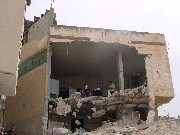 There was a moment, though, when we turned a corner
There was a moment, though, when we turned a corner 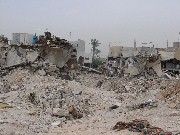 and
entered the center of the wreckage. People have described it as a
"moonscape", or a very severe earthquake aftermath. Some are calling
it "Jenin Ground Zero" - the scene reminded us of images following the
World Trade Center attack. Nothing but crumbling buildings and rubble,
cloaked in an other-worldly haze of smoke and dust. A handful of
bulldozers were moving about, scraping away. "Danger" is scrawled
in Arabic across buildings. Every now and then we heard the sound of rubble
falling. People were sitting in the second stories of half-destroyed
buildings that surround the central area, sipping on tea and surveying
the destruction. Here and there you see something in the rubble that
has not been totally destroyed - a baby's chair, a section of furniture,
a piece of a garment. There is a hushed awe about this place.
Rarely do you find silence in Arab society, but here in this gaping wound
is silence. We watched for a while as medical volunteers and family
members, wearing latex gloves and face masks, dug at a pile of rubble with
shovels and their hands. Before we arrived, some of the University
students told us, a torso and a leg had been found. We saw the white plastic
bodybag, and waited a bit. and
entered the center of the wreckage. People have described it as a
"moonscape", or a very severe earthquake aftermath. Some are calling
it "Jenin Ground Zero" - the scene reminded us of images following the
World Trade Center attack. Nothing but crumbling buildings and rubble,
cloaked in an other-worldly haze of smoke and dust. A handful of
bulldozers were moving about, scraping away. "Danger" is scrawled
in Arabic across buildings. Every now and then we heard the sound of rubble
falling. People were sitting in the second stories of half-destroyed
buildings that surround the central area, sipping on tea and surveying
the destruction. Here and there you see something in the rubble that
has not been totally destroyed - a baby's chair, a section of furniture,
a piece of a garment. There is a hushed awe about this place.
Rarely do you find silence in Arab society, but here in this gaping wound
is silence. We watched for a while as medical volunteers and family
members, wearing latex gloves and face masks, dug at a pile of rubble with
shovels and their hands. Before we arrived, some of the University
students told us, a torso and a leg had been found. We saw the white plastic
bodybag, and waited a bit. 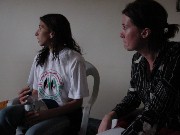 Before
long, a Before
long, a 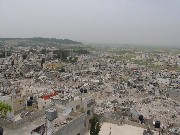 decomposing
hand (or so we were told - it looked like a maroonish lump to us) was added
to the bag. The students from the University have offered their services
in whatever ways they might be helpful. Their biggest duty right
now is acting as translators for aid workers and foreign journalists.
We joined one group of students and a journalist as they spoke with a 15
year-old girl. She has been keeping a diary since the beginning of
the Intifada, the makings of an intriguing story. When asked
if she wrote about her feelings, she said no, she only wrote the facts
- from TV, radio, and her window. Numbness might be the safest reaction
to this place. Her family was kept in one room for a week - twenty-four
of them - while soldiers took over their house to shoot at the rest of
the camp. When anyone had to use the bathroom, they knocked on the door
and asked the soldiers for permission. For meals, one woman was allowed
to go to the kitchen and prepare food. The rest of the time, night and
day, they were crowded together, hearing the sounds of the war outside
and the soldiers in their home. The girl's father spoke about that
first moment of stepping outside, after the seige was lifted, and feeling
like they were alive again, like a new birth. And then he said that feeling
dissipated into horror as they realized the extent of the devastation. decomposing
hand (or so we were told - it looked like a maroonish lump to us) was added
to the bag. The students from the University have offered their services
in whatever ways they might be helpful. Their biggest duty right
now is acting as translators for aid workers and foreign journalists.
We joined one group of students and a journalist as they spoke with a 15
year-old girl. She has been keeping a diary since the beginning of
the Intifada, the makings of an intriguing story. When asked
if she wrote about her feelings, she said no, she only wrote the facts
- from TV, radio, and her window. Numbness might be the safest reaction
to this place. Her family was kept in one room for a week - twenty-four
of them - while soldiers took over their house to shoot at the rest of
the camp. When anyone had to use the bathroom, they knocked on the door
and asked the soldiers for permission. For meals, one woman was allowed
to go to the kitchen and prepare food. The rest of the time, night and
day, they were crowded together, hearing the sounds of the war outside
and the soldiers in their home. The girl's father spoke about that
first moment of stepping outside, after the seige was lifted, and feeling
like they were alive again, like a new birth. And then he said that feeling
dissipated into horror as they realized the extent of the devastation. 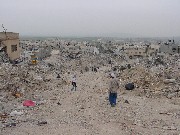 We
continued up to the mosque, which the Israeli army used as an outpost.
From there, we got a fuller vision of what it looked like below (click
for larger view). Ironically, we could see verdant farmfields
in the distance, stretching out past the Green Line and on into the relative
normalcy of Israel itself. Anger bubbles up, as does sadness and
overpowering grief - for for what is known, what will be known, and what
may never be known about what happened here. We returned home in
time to hear an Israeli spokesman on TV summarize what happened in Jenin
as a "fierce gun battle." The lies around here are thicker than the
dust that emanates from "Ground Zero". We
continued up to the mosque, which the Israeli army used as an outpost.
From there, we got a fuller vision of what it looked like below (click
for larger view). Ironically, we could see verdant farmfields
in the distance, stretching out past the Green Line and on into the relative
normalcy of Israel itself. Anger bubbles up, as does sadness and
overpowering grief - for for what is known, what will be known, and what
may never be known about what happened here. We returned home in
time to hear an Israeli spokesman on TV summarize what happened in Jenin
as a "fierce gun battle." The lies around here are thicker than the
dust that emanates from "Ground Zero". |
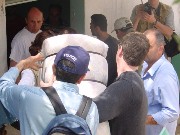 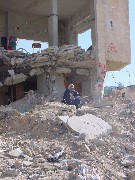 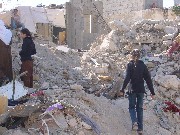 Thursday,
4/24/02: School is back to full capacity, apart from a handful
of students and one teacher who is getting married tomorrow (normalcy welcome).
The ilhamdulillah as-salaame ("thank God you're safe") greetings
we heard around the Camp yesterday echoed here in school. We are
getting a lot of ribbing about "running away," but it's good-natured (little
do they know we have a rental car to return!). Around nine this morning,
Marthame and Abuna Aktham left school for Jenin to meet the Latin Patriarch,
Michel Sabbah. He was on his way from Jerusalem with a convoy of
relief goods headed into the city for distribution - Caritas, Catholic
Relief Services, Lutheran World Federation, Mennonite Central Committee,
World Vision, and others had coordinated their work. They waited
near the Jalame checkpoint for four hours. The soldiers were refusing
entrance to Palestinians with Jerusalem IDs, but eventually they were let
through. Then there was the Thursday,
4/24/02: School is back to full capacity, apart from a handful
of students and one teacher who is getting married tomorrow (normalcy welcome).
The ilhamdulillah as-salaame ("thank God you're safe") greetings
we heard around the Camp yesterday echoed here in school. We are
getting a lot of ribbing about "running away," but it's good-natured (little
do they know we have a rental car to return!). Around nine this morning,
Marthame and Abuna Aktham left school for Jenin to meet the Latin Patriarch,
Michel Sabbah. He was on his way from Jerusalem with a convoy of
relief goods headed into the city for distribution - Caritas, Catholic
Relief Services, Lutheran World Federation, Mennonite Central Committee,
World Vision, and others had coordinated their work. They waited
near the Jalame checkpoint for four hours. The soldiers were refusing
entrance to Palestinians with Jerusalem IDs, but eventually they were let
through. Then there was the 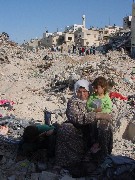 waiting
at the Benevolence Center to unload the four trucks - another couple of
hours - before heading into the Camp. Around a hundred people all
told, Jerusalemites and foreigners alike. Marthame ran into some
students from the University and spent the rest of the afternoon with them,
similar to yesterday. There are a few more bulldozers, which have
begun to find walls of buildings buried in some places. You can't
get used to this waiting
at the Benevolence Center to unload the four trucks - another couple of
hours - before heading into the Camp. Around a hundred people all
told, Jerusalemites and foreigners alike. Marthame ran into some
students from the University and spent the rest of the afternoon with them,
similar to yesterday. There are a few more bulldozers, which have
begun to find walls of buildings buried in some places. You can't
get used to this 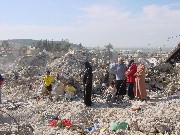 scene,
though (video - 27 sec.). Men carrying
armfuls of clothes, children digging at the rubble with bent pipes, women
just sitting and despairing. This work will carry on for a long,
long time, but the journalists and international attention will likely
go away. It's awful. Truly awful. As we put the day to
rest back in Zababdeh, gunfire sounds again from the military camp.
There's nothing quite like getting used to it all. scene,
though (video - 27 sec.). Men carrying
armfuls of clothes, children digging at the rubble with bent pipes, women
just sitting and despairing. This work will carry on for a long,
long time, but the journalists and international attention will likely
go away. It's awful. Truly awful. As we put the day to
rest back in Zababdeh, gunfire sounds again from the military camp.
There's nothing quite like getting used to it all. |
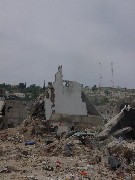 Friday,
4/26/02: We both joined with the students from the University
in their volunteer work at Jenin Camp. There wasn't as much to do
as there had been over the previous few days, maybe because it was Friday.
Elizabeth joined a couple students Friday,
4/26/02: We both joined with the students from the University
in their volunteer work at Jenin Camp. There wasn't as much to do
as there had been over the previous few days, maybe because it was Friday.
Elizabeth joined a couple students 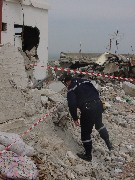 and
went off looking for needy journalists. After a couple spins around the
camp and no nibbles on the line, they returned to the UNRWA girls' school
(the staging area for most NGOs and our designated meeting spot).
There, they got notice that a translator was needed by a journalist with
Time
magazine. Elizabeth and a student headed off to help him interview a political
leader in the camp. They saw his home, which was not obliterated in "Ground
Zero," but rather blasted and burned by missiles from a helicopter attack.
He wasn't there at the time. When he and his family went to prayer at the
mosque, they (Elizabeth, student, journalist, and journalist's fixer) stayed
and discussed violent and non-violent resistance to occupation, especially
comparing India and Palestine. When our host returned, they had lunch (a
generous spread of bread, chicken and kebab) with him and his family -
humbling to be fed by people without a home. As the meal ended, someone
from Bill Moyers' PBS show "Now" came to do an interview as well. One question
she asked was why Palestinians had refused the goods sent to the camp from
the US. He responded that the helicopters, tanks, missiles, and bullets
that destroyed Jenin Camp were from America--how could people be expected
to forget that and accept gifts. If America didn't want this disaster,
then it should have prevented it. Additionally, many of the goods offered
by America were made in Israel. Like salt in a wound. After the interview,
they followed the team around as they moved through the camp, ending at
the and
went off looking for needy journalists. After a couple spins around the
camp and no nibbles on the line, they returned to the UNRWA girls' school
(the staging area for most NGOs and our designated meeting spot).
There, they got notice that a translator was needed by a journalist with
Time
magazine. Elizabeth and a student headed off to help him interview a political
leader in the camp. They saw his home, which was not obliterated in "Ground
Zero," but rather blasted and burned by missiles from a helicopter attack.
He wasn't there at the time. When he and his family went to prayer at the
mosque, they (Elizabeth, student, journalist, and journalist's fixer) stayed
and discussed violent and non-violent resistance to occupation, especially
comparing India and Palestine. When our host returned, they had lunch (a
generous spread of bread, chicken and kebab) with him and his family -
humbling to be fed by people without a home. As the meal ended, someone
from Bill Moyers' PBS show "Now" came to do an interview as well. One question
she asked was why Palestinians had refused the goods sent to the camp from
the US. He responded that the helicopters, tanks, missiles, and bullets
that destroyed Jenin Camp were from America--how could people be expected
to forget that and accept gifts. If America didn't want this disaster,
then it should have prevented it. Additionally, many of the goods offered
by America were made in Israel. Like salt in a wound. After the interview,
they followed the team around as they moved through the camp, ending at
the 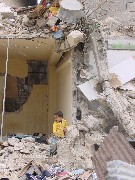 UNRWA
school again. It was rather heady to be around such big-time journalists,
and Elizabeth wishes she could say she helped them a bit, but the truth
is that her Arabic is still not that good, and the AAUJ student translated
for them expertly. Meanwhile, Marthame headed off with a couple of
students to scout out. For a while, they worked with a group of French
firemen who had come to help identify undetonated explosives (a few are
set off each day as people scrape through the rubble - both Israeli and
Palestinian booby traps) and identify which buildings were too unstable
for people to stay in. It's hard to imagine that any of these buildings
could be safe for habitation. They also joined up with a couple of
Greek journalists who were doing a story on the destruction in the Camp.
The stories that they heard ran along these lines: the area that is now
known as "Ground Zero Jenin" was initially covered by a green tarp by local
community leaders in order to prevent air surveillance from aiding the
Israeli invasion. UNRWA
school again. It was rather heady to be around such big-time journalists,
and Elizabeth wishes she could say she helped them a bit, but the truth
is that her Arabic is still not that good, and the AAUJ student translated
for them expertly. Meanwhile, Marthame headed off with a couple of
students to scout out. For a while, they worked with a group of French
firemen who had come to help identify undetonated explosives (a few are
set off each day as people scrape through the rubble - both Israeli and
Palestinian booby traps) and identify which buildings were too unstable
for people to stay in. It's hard to imagine that any of these buildings
could be safe for habitation. They also joined up with a couple of
Greek journalists who were doing a story on the destruction in the Camp.
The stories that they heard ran along these lines: the area that is now
known as "Ground Zero Jenin" was initially covered by a green tarp by local
community leaders in order to prevent air surveillance from aiding the
Israeli invasion. 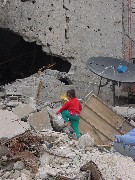 Fire
bombs dropped from Cobra helicopters soon took care of that cover, as well
as beginning some of the initial destruction. It is suspected that
a collaborator was somehow signaling the Israeli air force which homes
to target (we heard both by some kind of laser pointer and also by some
kind of marking powder). When he was discovered by leaders of the
Camp, rather than carry out their revenge, they made him do the same to
one of the houses in which the Israeli army had set up base. This
is where the thirteen soldiers were killed. This differs widely from
the Israeli army's story, that they entered a booby-trapped house.
Neither is far from what is possible in this place. Marthame's group
also accompanied a Japanese photojournalist who is working on a book.
He is interviewing fifty 18 year-old Israelis and fifty 18 year-old Palestinians
to help the Japanese public understand the conflict. Searching the
Camp for an 18 year-old girl proved difficult, it turned out. Many
families have relocated, seeking shelter where they can - in Jenin itself,
with families in other parts of the Camp, in nearby villages like Rummane
and Burqin. You slowly begin to notice
how few men are around, especially young men. It is mostly women
and young children sifting through the remains of their homes. Many
others have been arrested, many are presumed dead. There was, in
parts of the Camp, the unmistakeable stench of death. Elsewhere,
it's simply raw sewage that permeates the air. Back in Zababdeh,
the unwelcome sound of gunfire has returned to the Israeli military training
camp (audio - 5 sec.). Heck of
a lullaby. Fire
bombs dropped from Cobra helicopters soon took care of that cover, as well
as beginning some of the initial destruction. It is suspected that
a collaborator was somehow signaling the Israeli air force which homes
to target (we heard both by some kind of laser pointer and also by some
kind of marking powder). When he was discovered by leaders of the
Camp, rather than carry out their revenge, they made him do the same to
one of the houses in which the Israeli army had set up base. This
is where the thirteen soldiers were killed. This differs widely from
the Israeli army's story, that they entered a booby-trapped house.
Neither is far from what is possible in this place. Marthame's group
also accompanied a Japanese photojournalist who is working on a book.
He is interviewing fifty 18 year-old Israelis and fifty 18 year-old Palestinians
to help the Japanese public understand the conflict. Searching the
Camp for an 18 year-old girl proved difficult, it turned out. Many
families have relocated, seeking shelter where they can - in Jenin itself,
with families in other parts of the Camp, in nearby villages like Rummane
and Burqin. You slowly begin to notice
how few men are around, especially young men. It is mostly women
and young children sifting through the remains of their homes. Many
others have been arrested, many are presumed dead. There was, in
parts of the Camp, the unmistakeable stench of death. Elsewhere,
it's simply raw sewage that permeates the air. Back in Zababdeh,
the unwelcome sound of gunfire has returned to the Israeli military training
camp (audio - 5 sec.). Heck of
a lullaby. |
|
Saturday, 4/27/02: A much quieter day for the two of us than most we've had recently. Elizabeth taught her classes at school. A new plan has been mapped out for the rest of the year which will focus on fundamental classes and try to make up for lost time. Marthame stayed at home recovering from the stress of the last few days - a sunburn, a migraine headache, and (no doubt) the emotional toll knocked him for a loop. The generator turns off about 11 AM in the morning, giving a much better hearing of the shooting from the military camp (audio - 7 sec.) - though the birds' chirping provides a nice counterpoint. Several students from the school are making web pages about their experiences over the last few weeks. A ninth grader kept a journal of what was happening in nearby Qabatiya, including when he and his father were summoned to the town's school by the Israeli military. An eighth grader has been spending quite a bit of time recently at Jenin Camp documenting things and expects to have a site up soon. Others, including teachers, have been volunteering in the relief efforts. Again, the students at the school are taking a collection to help people in the camp. Word came on TV tonight about another Palestinian attack on a West Bank settlement. Unfortunately, we're not surprised. Tomorrow is Palm Sunday (we celebrate here on the Orthodox calendar) - it's time for something holy in this land. |
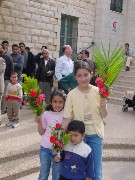 Sunday,
4/28/02: Happy Palm Sunday. We're on the Orthodox calendar here,
regardless of denomination, as a sign of Christian unity. The bells
were ringing loud and clear this morning as people headed to church in
the warm sunshine. Kids were dressed in their best clothes, carrying home-made
"palms," sometimes actual palm leaves but more often than not olive branches
tied together with roses or other flowers. Palm Sunday is a big deal here.
Before this Sunday,
4/28/02: Happy Palm Sunday. We're on the Orthodox calendar here,
regardless of denomination, as a sign of Christian unity. The bells
were ringing loud and clear this morning as people headed to church in
the warm sunshine. Kids were dressed in their best clothes, carrying home-made
"palms," sometimes actual palm leaves but more often than not olive branches
tied together with roses or other flowers. Palm Sunday is a big deal here.
Before this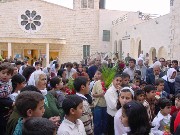 Intifada
and siege began nearly two years ago, most of Zababdeh would ride in busses
to Jerusalem for the massive march from Bethpage into the Old City. Now,
even if the roads were open, getting into Jerusalem is next to impossible
for these people. Last year, the priests
in Zababdeh coordinated a march through the village. But this year, we
didn't even do that. Wanting to see Fr. Hossam, the Anglican priest, we
stopped by St. Matthew's church early. People were gathering, and the church
was decorated with beautiful tall palm branches at the entrance. But Fr.
Hossam was not there. He did finally make the long, difficult trek from
Nablus
in time to celebrate with the community. We made our way for the
Latin Church of Visitation. The churchyard was full of people and palms.
The congregation gathered around Abuna Aktham as he blessed the table piled
high with olive branches. Then a line of excited and proud kids led
the short procession from one end of the convent to the church doors.
Abuna knocked three times, and the doors were opened to the singing of
"Hosannah Hosannah." (video - 12 sec.).
After church, we went to visit friends and share lunch. Our host worships
in the Latin church, but her daughter (with whom she lives) and grandchildren
and Intifada
and siege began nearly two years ago, most of Zababdeh would ride in busses
to Jerusalem for the massive march from Bethpage into the Old City. Now,
even if the roads were open, getting into Jerusalem is next to impossible
for these people. Last year, the priests
in Zababdeh coordinated a march through the village. But this year, we
didn't even do that. Wanting to see Fr. Hossam, the Anglican priest, we
stopped by St. Matthew's church early. People were gathering, and the church
was decorated with beautiful tall palm branches at the entrance. But Fr.
Hossam was not there. He did finally make the long, difficult trek from
Nablus
in time to celebrate with the community. We made our way for the
Latin Church of Visitation. The churchyard was full of people and palms.
The congregation gathered around Abuna Aktham as he blessed the table piled
high with olive branches. Then a line of excited and proud kids led
the short procession from one end of the convent to the church doors.
Abuna knocked three times, and the doors were opened to the singing of
"Hosannah Hosannah." (video - 12 sec.).
After church, we went to visit friends and share lunch. Our host worships
in the Latin church, but her daughter (with whom she lives) and grandchildren
and 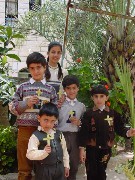 greatgrandchildren
worship in the greatgrandchildren
worship in the 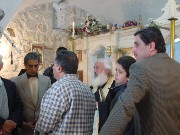 Orthodox
church. Since married women usually "convert" to their husband's
denomination, mothers and their daughters sometimes wind up in different
churches. We relaxed in their courtyard as we waited for the Orthodox worshippers
to arrive - Orthodox services being reliably longer than Latin or Anglican
ones. After a delicious meal, good fellowship, and plenty of coffee, we
headed home. On the way, we stopped to visit with Abuna To'mie, the Orthodox
priest. He was on his way back to church for the daily Holy Week prayers
(from 4 to 6). So after a short pit stop at home, Marthame headed out again
to St. George's. Not many people come for daily prayer, usually just
Abuna and a handful of liturgists. Today was an exception, as several
dozen joined together in the ancient liturgy of prayer and chanting. Marthame
stayed afterwards to help Abuna ready the church for the rest of Holy Week,
changing the colors of various decorations to a somber liturgical black.
Our day finished with a nice visit from a friendwho is studying at An-Najah
University in Nablus. Assuming the university doesn't have to close again,
he will complete his final semester in a couple months, and graduate with
a BA in Music. We hope so... Orthodox
church. Since married women usually "convert" to their husband's
denomination, mothers and their daughters sometimes wind up in different
churches. We relaxed in their courtyard as we waited for the Orthodox worshippers
to arrive - Orthodox services being reliably longer than Latin or Anglican
ones. After a delicious meal, good fellowship, and plenty of coffee, we
headed home. On the way, we stopped to visit with Abuna To'mie, the Orthodox
priest. He was on his way back to church for the daily Holy Week prayers
(from 4 to 6). So after a short pit stop at home, Marthame headed out again
to St. George's. Not many people come for daily prayer, usually just
Abuna and a handful of liturgists. Today was an exception, as several
dozen joined together in the ancient liturgy of prayer and chanting. Marthame
stayed afterwards to help Abuna ready the church for the rest of Holy Week,
changing the colors of various decorations to a somber liturgical black.
Our day finished with a nice visit from a friendwho is studying at An-Najah
University in Nablus. Assuming the university doesn't have to close again,
he will complete his final semester in a couple months, and graduate with
a BA in Music. We hope so... |
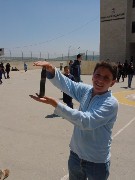 Monday,
4/29/02: At assembly this morning, a student showed Marthame
a huge shell, which he found near his home in Jenin. Later at breaktime,
the kids excitedly displayed it for Elizabeth. It is a little disconcerting
to be so close to such things, especially as kids parade them about.
On the lighter side, a round of mabrouk (congratulations) was in
order for one of the school's English teachers, who got married this weekend.
In better times, the school's teachers would have gone to nearby Tubas
for the party, and the newlywed would distribute Monday,
4/29/02: At assembly this morning, a student showed Marthame
a huge shell, which he found near his home in Jenin. Later at breaktime,
the kids excitedly displayed it for Elizabeth. It is a little disconcerting
to be so close to such things, especially as kids parade them about.
On the lighter side, a round of mabrouk (congratulations) was in
order for one of the school's English teachers, who got married this weekend.
In better times, the school's teachers would have gone to nearby Tubas
for the party, and the newlywed would distribute 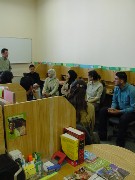 sweets
at school upon return. But there was no party and there were no sweets.
Like the first Intifada, the current struggle mutes celebrations
in respect for the dead and suffering - his family alone had four killed
in the recent Israeli operations. He still managed to look the part of
the newlywed, though. Marthame went to the University
to take a look at their language lab, as the Latin school is interested
in installing one as well. Such a facility would be a boon for our students,
who rarely have the opportunity to hear and speak English or French outside
their lessons. We'll be working on grant-writing for this project. Later
today, Marthame bumped into a friend who said his cousin was killed in
Qabatiya. It was hard to hear how this young man, a good student involved
in civic and peace initiatives, was killed with a bullet in his head. His
fatal mistake was leaning out the window to get better cell phone reception
as tanks entered the village. Few families have been left untouched.
After classes today, we headed back to Nazareth,
to make good on a committment to help the folks who have so kindly put
us up during our exile. They needed two people to help with their weekly
youth English class, which had kids from sixth to eleventh grade. We helped
with online tutorials, SRA reading packs, and a rousing game of Outburst
Jr. We then fueled up on hummus and set about writing an overdue article
for Christian Century
magazine - they just published another piece
of ours in their most recent issue. sweets
at school upon return. But there was no party and there were no sweets.
Like the first Intifada, the current struggle mutes celebrations
in respect for the dead and suffering - his family alone had four killed
in the recent Israeli operations. He still managed to look the part of
the newlywed, though. Marthame went to the University
to take a look at their language lab, as the Latin school is interested
in installing one as well. Such a facility would be a boon for our students,
who rarely have the opportunity to hear and speak English or French outside
their lessons. We'll be working on grant-writing for this project. Later
today, Marthame bumped into a friend who said his cousin was killed in
Qabatiya. It was hard to hear how this young man, a good student involved
in civic and peace initiatives, was killed with a bullet in his head. His
fatal mistake was leaning out the window to get better cell phone reception
as tanks entered the village. Few families have been left untouched.
After classes today, we headed back to Nazareth,
to make good on a committment to help the folks who have so kindly put
us up during our exile. They needed two people to help with their weekly
youth English class, which had kids from sixth to eleventh grade. We helped
with online tutorials, SRA reading packs, and a rousing game of Outburst
Jr. We then fueled up on hummus and set about writing an overdue article
for Christian Century
magazine - they just published another piece
of ours in their most recent issue. |
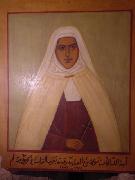 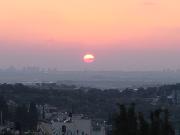 Tuesday,
4/30/02: We woke up in Nazareth and headed south to the checkpoint.
Marthame dropped Elizabeth off and she walked across, first being checked
by some baffled soldiers. She walked maybe fifty meters to the gas station
on the checkpoint road, where a taxi was waiting to take her back to Zababdeh
in time to teach her seventh-graders. She only has one class a day
now that the remainder of the school year has been concentrated. She misses
teaching especially the first and second graders, who are so cute and sweet.
She misses teaching most of the eleventh graders, too - but she's just
as glad no longer to discipline the more mischevious ones. School is still
(since last Thursday) running at full steam, with all our students and
all our teachers able to attend and eager to make up for lost time. And
today, the electricity schedule was extended, so that there are only three
hours (from 1 to 4 PM) without power. Oh, the luxury! The school now offers
only one religion class a week, which Abuna and the sisters are covering,
so Marthame is staying in the Galilee until Easter (Orthodox Easter - and
thus Zababdeh Easter) to take care of some work. After Elizabeth
was successfully across, he headed up to Ibillin to make some visits.
After picking up some clothes from Mar Elias College, he headed off to
see the St. Joseph Sisters of Ibillin. They had stockpiled some food
for the West Bank, particularly for Zababdeh. They were proud to
show off their church and their very own native saint. St. Mary Jesus
the Crucified was a miracle child who was soon orphaned. While fleeing
persecution in Egypt, she had a vision of the Virgin Mary, after which
she entered religious life. She died while ministering in Bethlehem
in the late 19th Century - at the same moment, the bells rang by themselves
in the church in Ibillin. In 1983, she was canonized, but - the sister
confided - the people of Ibillin have called her a saint since the day
she died. Marthame also visited with our Korean friends who are still
marooned from their home in Nazareth. The longer they stay out, the
more homesick they get, and the more concerned they get for their friends
still stuck under curfew. Tomorrow it's supposed to be lifted for
four hours for people to do shopping. Other friends stuck in Bethlehem
are counting the days - 30 now - that they've been confined to virtual
house arrest. It's hard to remember how many civilians are still
caught by the tight siege. At least a beautiful sunset over Ibillin
(along with a home-cooked Korean meal) could bring some comfort. Tuesday,
4/30/02: We woke up in Nazareth and headed south to the checkpoint.
Marthame dropped Elizabeth off and she walked across, first being checked
by some baffled soldiers. She walked maybe fifty meters to the gas station
on the checkpoint road, where a taxi was waiting to take her back to Zababdeh
in time to teach her seventh-graders. She only has one class a day
now that the remainder of the school year has been concentrated. She misses
teaching especially the first and second graders, who are so cute and sweet.
She misses teaching most of the eleventh graders, too - but she's just
as glad no longer to discipline the more mischevious ones. School is still
(since last Thursday) running at full steam, with all our students and
all our teachers able to attend and eager to make up for lost time. And
today, the electricity schedule was extended, so that there are only three
hours (from 1 to 4 PM) without power. Oh, the luxury! The school now offers
only one religion class a week, which Abuna and the sisters are covering,
so Marthame is staying in the Galilee until Easter (Orthodox Easter - and
thus Zababdeh Easter) to take care of some work. After Elizabeth
was successfully across, he headed up to Ibillin to make some visits.
After picking up some clothes from Mar Elias College, he headed off to
see the St. Joseph Sisters of Ibillin. They had stockpiled some food
for the West Bank, particularly for Zababdeh. They were proud to
show off their church and their very own native saint. St. Mary Jesus
the Crucified was a miracle child who was soon orphaned. While fleeing
persecution in Egypt, she had a vision of the Virgin Mary, after which
she entered religious life. She died while ministering in Bethlehem
in the late 19th Century - at the same moment, the bells rang by themselves
in the church in Ibillin. In 1983, she was canonized, but - the sister
confided - the people of Ibillin have called her a saint since the day
she died. Marthame also visited with our Korean friends who are still
marooned from their home in Nazareth. The longer they stay out, the
more homesick they get, and the more concerned they get for their friends
still stuck under curfew. Tomorrow it's supposed to be lifted for
four hours for people to do shopping. Other friends stuck in Bethlehem
are counting the days - 30 now - that they've been confined to virtual
house arrest. It's hard to remember how many civilians are still
caught by the tight siege. At least a beautiful sunset over Ibillin
(along with a home-cooked Korean meal) could bring some comfort. |
|
|